
Following up our coverage of resistance to the 2017 G20 summit in Hamburg, we present the conclusion to our coverage of the 2018 G20 summit in Buenos Aires, Argentina and the demonstrations against it. For two decades, we have studied global political and economic summits as sites for protest and intervention. For this purpose, it is just as important to study the summits at which the state has succeeded in imposing social peace, however artificial, as the summits at which they have completely lost control of the situation. A complete analysis of the summit in Buenos Aires would have to begin with the ¡Que se vayan todos! uprising of 2001 and trace the subsequent cooptation of Argentine social movements to account for the difference between the combative revolt that toppled several governments in succession 17 years ago and the comparatively tame response to an extremely repressive global summit in 2018. This report explores the events of the summit in great detail, however, and concludes with interviews about the mobilization.
We were pleased to work with “Pipette Relais,” a part of the same global networks that reported on the 2017 G20 summit, to publish the following reports.
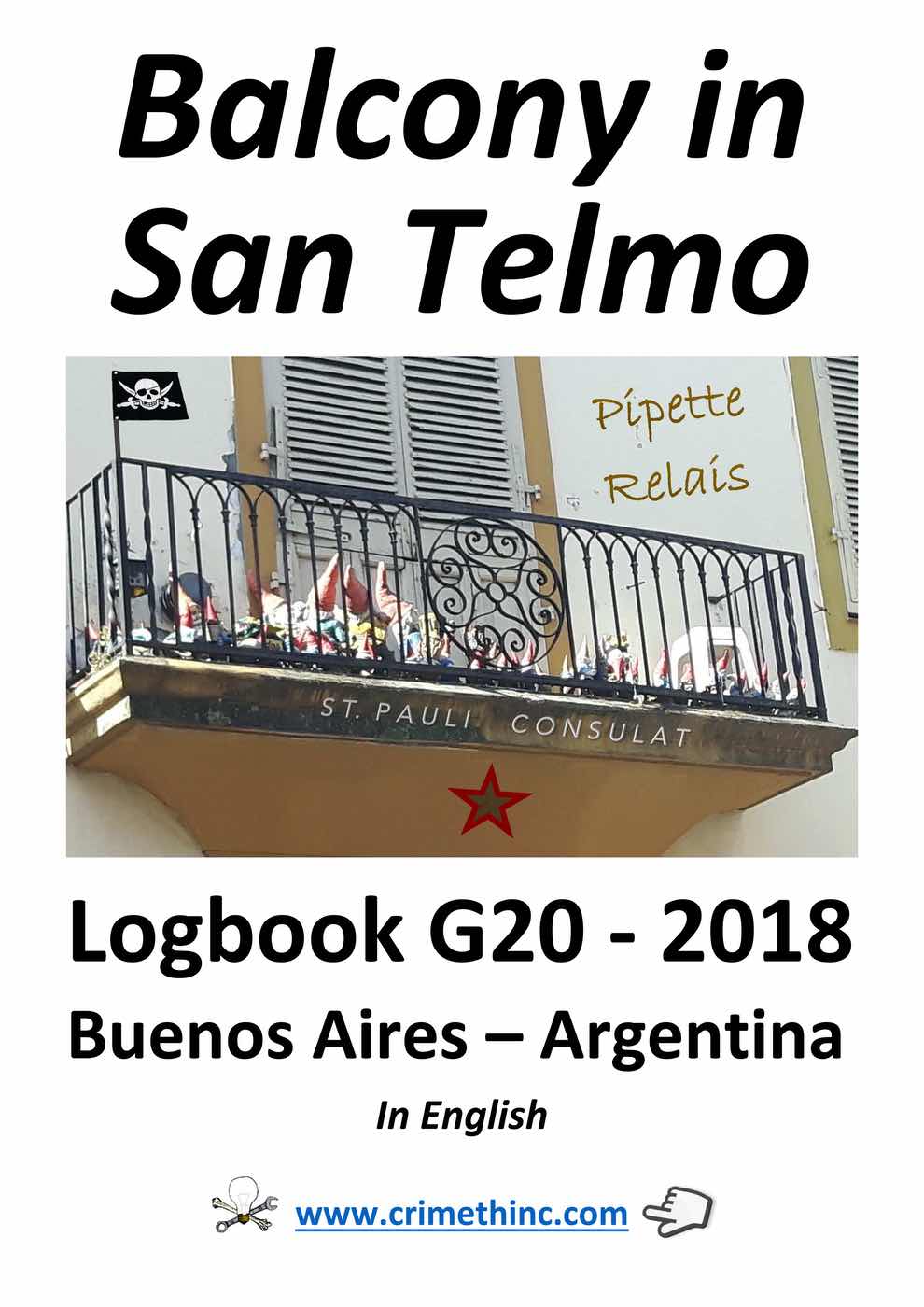
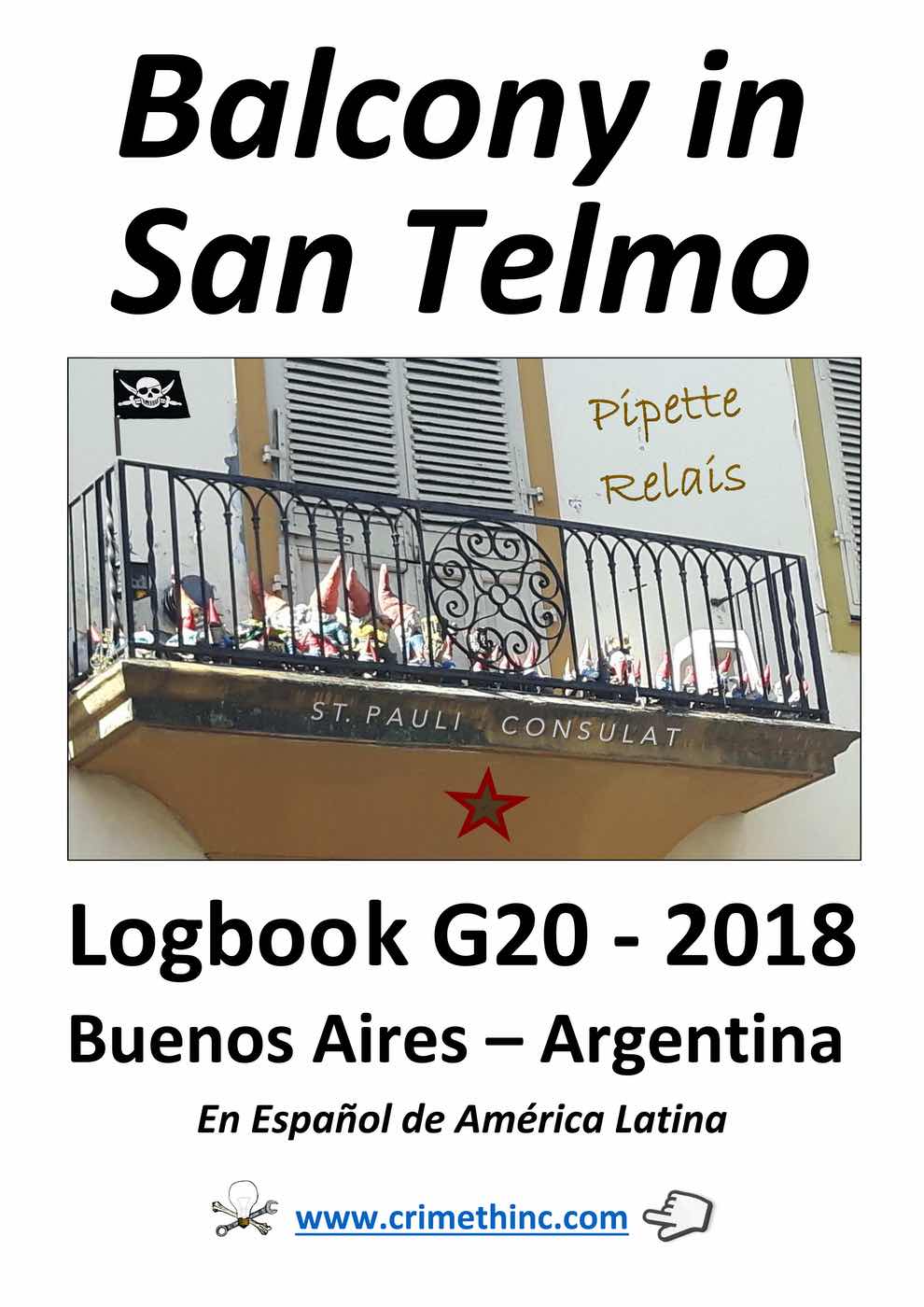
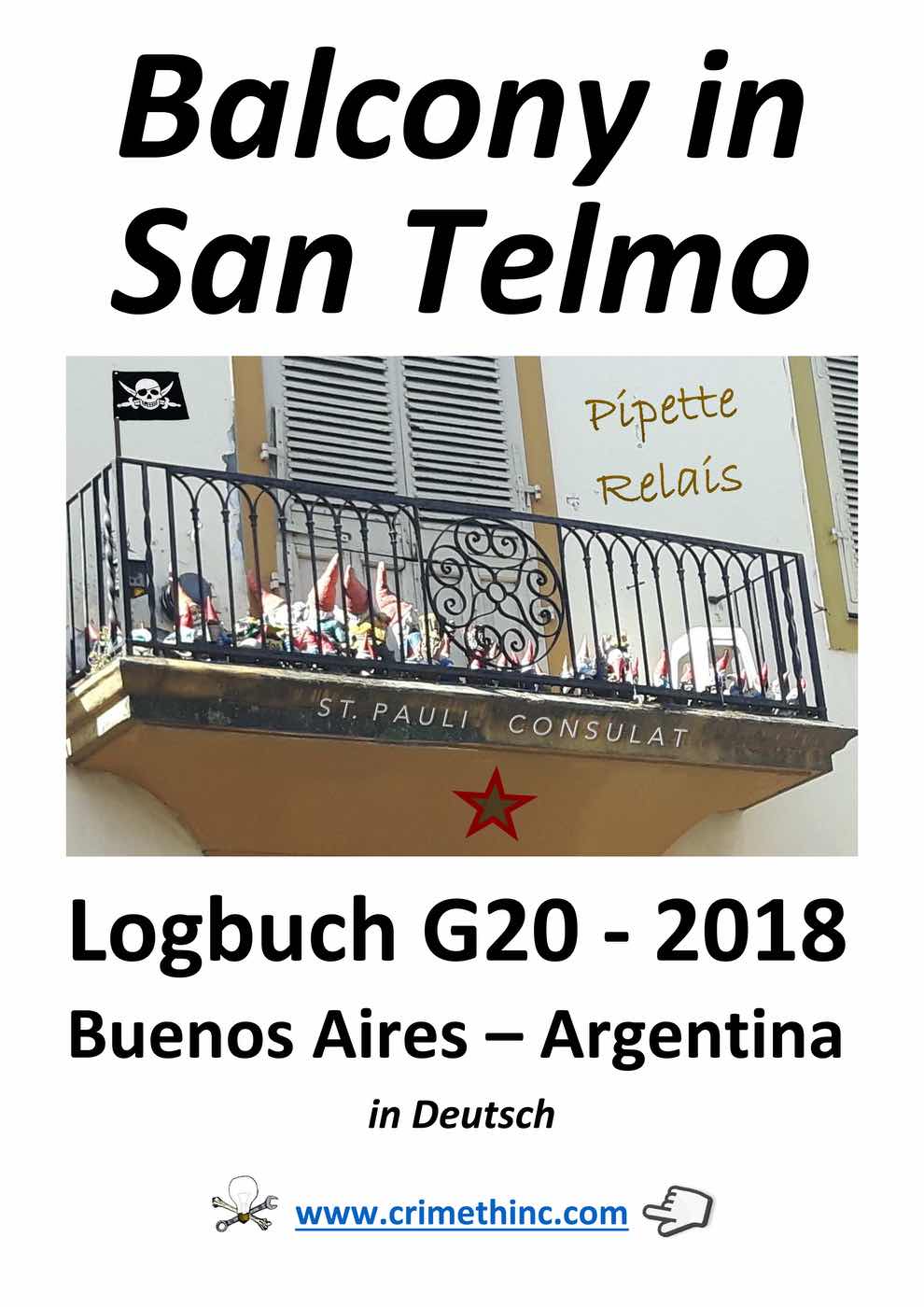
Read our coverage of the buildup to the 2018 G20 summit here:

St. Pauli consulate: a balcony in San Telmo.
Monday, November 26, 2018
Three Demonstrations
Two demonstrations on the same horrible topic began at 11 a.m. regarding activists shot by the police. 16 years ago, Darío Santillán and Maximiliano Kosteki, at that time 21 and 23 years old, were both murdered by police bullets in the back while attending protests against the disastrous economic situation. Since then, on the 26th of every month, their relatives, among others, have held demonstrations demanding that the responsible be punished. This was the first demonstration of the two demonstrations on November 26.
The second demonstration started only 500 meters away from the first with approximately 10,000 people in attendance. A particularly high proportion of the demonstrators were women and people with indigenous roots, the majority of whom were presumably originally from Bolivia, Peru, or Paraguay. It had been originally scheduled as a reaction to the murder of Rodolfo Orellana, committed in Matanza on Thursday the previous week. However, now the protest additionally addressed the death of another activist, 32-year-old Marcos Soria, in Córdoba on Saturday. A police bullet hit him in the head when he tried to flee after being beaten brutally—apparently for no reason—by two police officers.

Both men were unarmed, had neither used nor threatened violence, came from extremely poor backgrounds, and were involved in the Confederación de Trabajadores de la Economía Popular (CTEP—see description below).
Many began to suspect a connection between the two murders, that they were meant to deter activists from protesting against the G20. Almost anything seemed possible. Rumors of “1500 scheduled deaths during the G20” were circulating via dubious audio messages on WhatsApp and Facebook, especially in the socioeconomically precarious districts and suburbs. The government neither rejected nor denied these rumors.
The third demonstration started at 5 pm, an offshoot of the International Day for the Elimination of Violence against Women which took place the previous day. A few hours prior to the protest, two men had been acquitted of the rape and murder of 16-year-old Lucia despite the overwhelming evidence of their guilt. In reaction to this, people felt enormous anger and perceived powerlessness. Additionally, the demonstration was part of the wider-spread protest against the G20. The comparatively high participation of men at a feminist demonstration was striking, and their participation was representative of women’s major role in organizing the mobilization against the summit. This pattern of organizing and participation was also reflected in content explanations, events, and the external image of the protest alliance.
The demonstration proceeded without the usual machismo which is commonly expressed in Argentinian protests, and the only outstandingly visible presence of the protest was Nora “Norita” Cortiñas of the Mothers of the Plaza de Mayo. Norita, age 88, spoke at all three demonstrations held that day, and called for participation at the demonstration on November 30 against the G20. She explicitly asked listeners to not allow themselves to be intimidated.

Confederación de Trabajadores de la Economía Popular: An association of workers in the economy “from below” (i.e. a popular, grassroots movement). CTEP is a network of some 10,000 active people, many of whom are unemployed or in precarious employment. The network focuses on building its own self-determined counter-economy as well as directly combating hunger and homelessness in the poorer barrios. CTEP also includes many rural cooperatives whose products are distributed directly in the network, and CTEP’s urban structures supply high-quality machines and utensils to networked campesino organizations. Workers laid off by factory closings are increasingly taking over production facilities and organizing themselves within the framework of cooperatives and CTEP. The network is ideologically quite varied, but left-wing oriented.
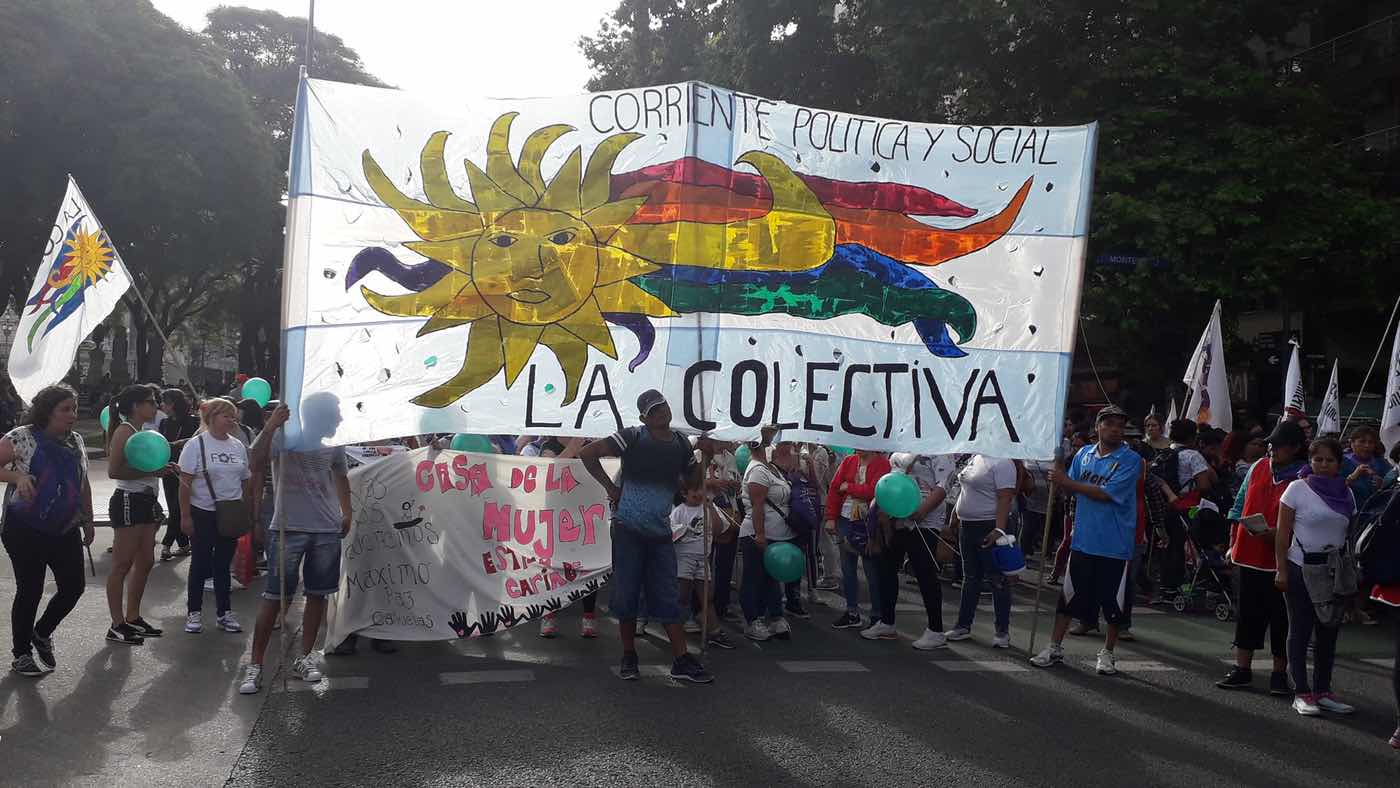
Tuesday, November 27, 2018
Peronist Protest
According to the organizers 50,000 attended the Peronist protest at the Atlético Atlanta stadium. Peronist grassroots organizations and trade unions rallied under the motto “No al G20, Fuera FMI” (“No to G20, IMF Out”) during the week of action against the G20. As had occurred at the “Day of Militant Peronism,” numerous speeches were made against Macri and the IMF. The Peronists saw the upcoming G20 summit as an occasion at which they could air these concerns. The event was dominated by left-wing Peronists, but the political wing of Kirchnerism was also involved, even though former president Cristina Fernández de Kirchner, popularly called “Cristina,” did not personally appear.
Many observers saw the rally as a kind of demo substitute for the Peronists because concurrent with the rally, most Peronist organizations hit the brakes on mobilizing for the November 30 anti-G20 demonstration. They justified this by pointing to transportation difficulties and the threat of repression which ordinary party members were not ready for. In addition, there was the issue of the 2019 presidential election, which was a priority for many and for the sake of which it was important to maintain unity within the Peronist movement. Kirchnerism, a political wing of Peronism, does not reject the G20 format in principle, and even took part in it with a certain pride during periods in office.

The Beginning of Barriers
The anti-G20 protest week included numerous discussion events and workshops. One event addressed the special concerns of city residents. However, this event was held relatively far away from the conference venue and the security zones. Compared to the 2017 G20 in Hamburg, the location of the 2018 summit was somewhat more remote.
Moreover, in the only directly adjacent barrio—Villa 31, a so-called “Villa Miseria”—migrants and other disadvantaged populations live at or below the subsistence level. Their day-to-day existence is characterized by struggle and they often live in fear of being deprived of the minimal civil rights remaining to them. In this barrio, the widespread attitude towards the G20 was accordingly passive. Meanwhile, the police began to carry out intensified security checks at the entrances to Villa 31. Residents reported that several documents police described as “incorrect” were confiscated and, in some cases, immediately torn apart.
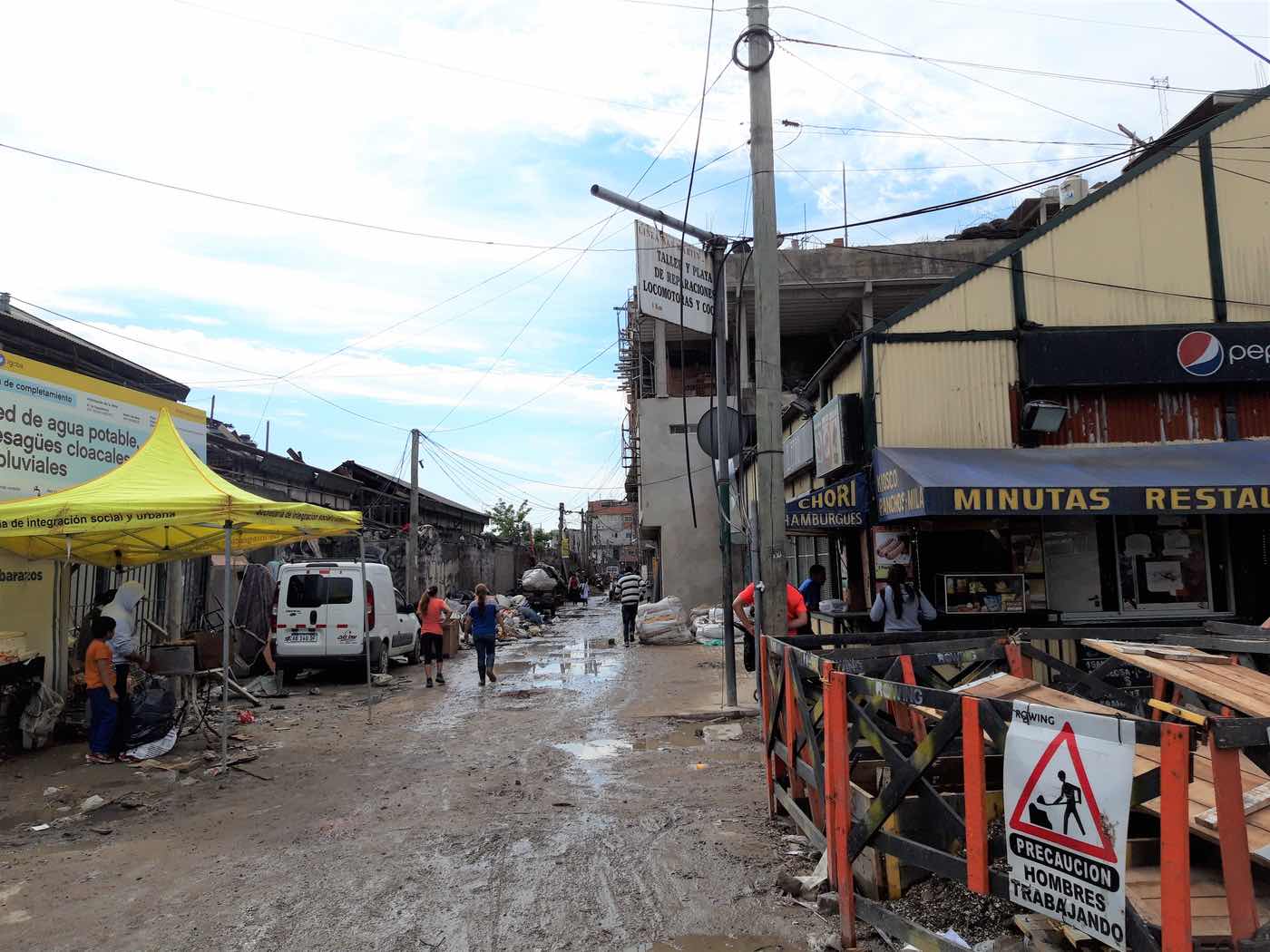
The situation was different in the large security zone around the Teatro Colón and in the hotel zone. Here, in contrast, an effort was made to explain security restrictions to residents and people working there. The security scheme in Buenos Aires was adapted from the frequently-installed security zone around the congress building. Anyone attempting to enter had to prove their identity and provide proof that they were authorized to access a building, such as proof of employment, residence, or a booked hotel bed. Many had expected worse and were preparing accordingly.
Meanwhile, trucks full of steel barrier lattices rolled towards the city center. The government had purchased 15,000 additional pieces—that is, 15 additional kilometers of barrier—that were unloaded and assembled. In some cases, the barriers extended over several kilometers, while in others they functioned only to close off a single road. What made some European observers shudder seemed to be accepted by the majority of city dwellers in a relatively cool manner. The actual construction of the barriers was carried out in the atmosphere of calm routine. There were no reports of spontaneous protests against its construction.

Setting up the barriers.
Wednesday, November 28, 2018
A Permit for the Demonstration
The protest alliance organized a brief morning press conference. It was announced that, after some negotiating, the government would allow the demonstration route to begin at the Avenida 9 de Julio and to pass through the Avenida de Mayo, up to the Congress. For the Confluencia alliance, it was a success to be able to demonstrate on major streets in the city center and end relatively close to the Teatro Colón, the location of the big summit dinner. Previously, security authorities had only offered narrow side streets as potential demonstration routes. At the suggestion of the government, the Argentine Nobel Peace Prize winner Adolfo Pérez Esquivel had ultimately mediated. He criticized the G20, claimed the right to demonstrate, and requested both sides renounce the use of violence. At the press conference, the protest alliance emphasized once again their commitment to non-violence.
Organizers then spoke about the People’s Summit which was to start at the Social Science University with more than 20 events listed in the program. These events did not include an informational event about the planned demonstration or the immense security measures, nor was there any public discussion at any point about these issues. The press release and phone number for the emergency legal hotline were made publicly available.
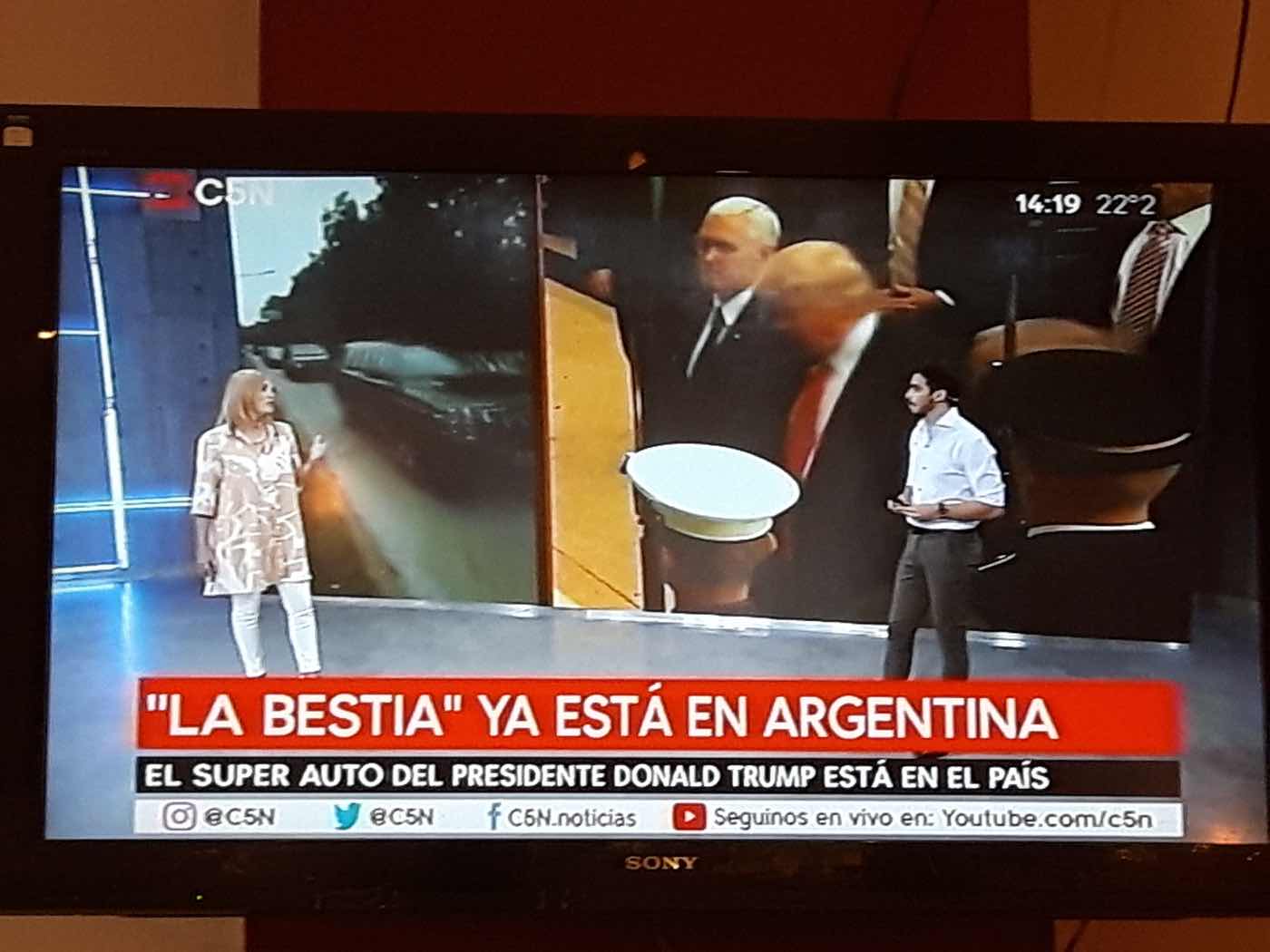
The State’s Dual Strategy
Despite the somewhat surprising concession in regards to the demonstration route, security forces emphasized that a massive contingent would be ready to immediately and forcefully prevent any disturbance, in particular any attempts to penetrate the barricaded-off areas. Police patrols in the city center also became noticeably denser. However, there was not a massive aggressive police presence. No hundred-person-strong troops, helicopters, or clearing tanks were seen in the city center. There was only a single water cannon and three, four-team cars parked in front of the Teatro Colón. Meanwhile, the lines of steel barricades continued to grow. They were not yet closed, but were instead loosely guarded. Car traffic was blocked from some major central streets beginning in the evening. The wide Avenidas, now empty, felt seemed quite disconcerting. It was a clear sign that normal life would soon be interrupted.
The biggest political news of the day was the cessation of the investigation into the death of Santiago Maldonado. Maldonado’s family and lawyer accused the examining magistrate of bias because the circumstances of Maldonado’s death clearly indicated that police officers had murdered him and systematically concealed their crime. It was also a slap in the face to the approximately 500,000 people who demonstrated in Buenos Aires not long before, demanding transparency concerning Maldonado’s death. In left-wing media and networks, “Santiago’s second death” was hotly discussed—and all this happened immediately after the two other murders, in which the police also denied their guilt, and immediately before the G20. The message seemed to be this: police officers can kill left-wing activists with impunity.
The fear of what the state might have planned for the demonstration was growing. People speculated, for example, that the government-approved area in front of Congress, with its many road closures, could easily become a trap. And all this with a police force, secret service, and judicial apparatus still infiltrated by many corrupt right-wing officers instated during the military dictatorship, groups which could apparently afford anything with the backing of security chief Bullrich and President Macri. Pessimists now expected only 10,000 participants to attend the demonstration. Many parents, especially from Peronist backgrounds, called their adult children to warn them urgently against demonstrating.

Thursday, November 29, 2018
The First Guests of the State
Macron was among the first to arrive, despite his own acute crisis in France. After an initial meeting with Macri, Macron fervently advocated Macri’s reform policy in front of the international press. The Saudi Arabian Crown Prince prudently remained in his own embassy because the international organization Human Rights Watch had reported him to the Argentine authorities for his involvement in the murder of journalist Khashoggi. Chancellor Merkel’s flight was cancelled due to technical problems which delayed her arrival by an entire day. Meanwhile, the U.S. President, who had arrived early, expressed his views on all kinds of global political issues in his own “thoughtful and balanced” way. The Chinese representatives began to unpack suitcases full of ready-to-sign bilateral treaties, several of which were with Argentina. Argentine TV showed first impressions and mishaps.


La “Cumbre De Los Pueblos”
The second day of the summit took place in a very large public venue. Several tents as well as a colorful market and a stage were set up in the central congressional square. Over the course of the day, around 5,000 participants attended the G20 summit events, including many representatives from neighboring countries such as Brazil, Chile, and Uruguay. The same topics were discussed as the day before—but with much more participation and public perception.
At the edge of the congressional square, all streets in the direction of Theatro Colón were closed, but passage was still possible for non-participants who had a justified reason or demonstrators who were perceived to be harmless. A banner with greetings from No G20 Hamburg was placed on the barrier facing the Parliament building and at the end of the evening, there was a brilliant protest concert.

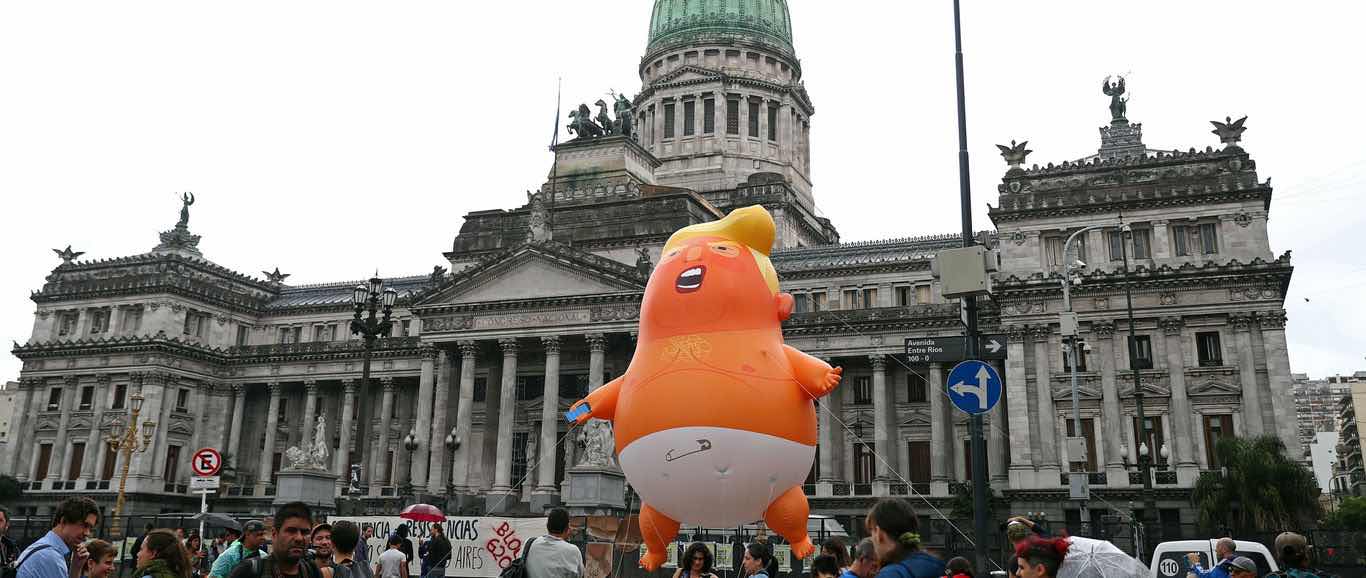
The Evening Before the Summit
The barriers had gradually been closed and secured and were now guarded by a massive police force. The large metro line, line B, ceased operation. Thousands of stranded people looked for a bus to take, and some walked many kilometers from work back to their homes. In the areas behind the barriers, there were closed security zones around the hotels inhabited by G20 attendees and towards the meeting site. Police presence again noticeably intensified, especially around strategic points such as the main metro station where an average of 1.2 million passengers commute every day. This presence was also seen at the Central Station Retiro, adjacent to Villa 31.
The G20 summit took over urban reality. The city was systematically shut down. The normal life of all residents was restricted. At most, people warily protested against individual barriers. The metropolis of Buenos Aires is huge, with more than 14 million inhabitants. Interruptions are quite normal here and people usually anticipate them in a stay-cool, metropolitan way. Security forces were not going over the top this time and acted as though the event was business as usual. Still, the population was frightened by the threat of government repression. They also faced the widespread and immediate demands of everyday life, which often left little room for direct engagement against the G20. People showed a great deal of caution and restraint.

Friday, November 30, 2018
The City
The subway and all suburban railways had completely stopped operation overnight. Buses, on the other hand, continued to run, with adapted routes so they could avoid the numerous barriers. Only three kilometers from the city center, everyday life continued as normal. But as one moved towards the center, toward the conference venues, hotels and demo route, the streets emptied. Many shops were closed, and many cars had been moved from the area. The traffic itself also dropped by about 80%, although a large number of money transporters drove hectically from station to station. “Avoid the Congress Zone” flashed on the message boards of the large Avenidas running towards the city, but there were almost no cars driving in that direction anyway.

The news tickers told of a small car, long since burnt out, parked near the demonstration route, in which police had allegedly found several boxes of Molotov cocktails. Now, columns of motorcycle cops armed with rubber bullets roamed the streets. The barriers were by then all closed, grim police units posed behind them.

The Demonstration
The demonstration meeting place began to fill hours in advance. The more radical left had arrived, including left-wing Peronist and Trotskyist parties and the relatively small anti-globalization movement. As is customary here, they brought the flags and banners of their own organizations with them. Banners specifically opposing the G20 were the minority. The most expressive block was at the front of the demo. Here was where things were the most direct, loud, and colorful. Behind this block was the Trotskyist party block, “MST,” carrying hundreds of flags and led by a human chain formed by women who had painted all sorts of national flags on their naked torsos. The FIT bloc, the rival Trotskyist party, was also very large, but it was at the rear of the demo, the order having been decided by lottery.


The large trade unions had been pressured not to attend, and so had critical members of civil society, affected neighborhoods, the cultural and art scene, the mass women’s movement, and the movement against police and judicial arbitrariness. In addition, Cristina Fernández de Kirchner had on the same morning called on listeners to refrain from attending the demonstration, which is why most of the remaining Peronist organizations and trade unions had dropped out at the last minute, or had appeared only in small numbers. Many prospective attendees also thought they would not even be allowed into the city center. In the end, there were about 50,000 participants—for Buenos Aires, this is a medium-sized demonstration. The organizers considered this a success in view of the circumstances: the government had not managed to stop the demonstration with its fear campaign and psychological warfare.
The demonstration, colorful and vociferous, nevertheless traversed the broad Avenida 9 de Julio to parliament. A Trump effigy was burned there and the demo immediately dissolved. This was partly due to the fact that the police had closed off all the streets except for a few small side streets. Those streets were the only point of retreat on an otherwise completely surrounded square, and participants feared that the area was a trap. Two smaller demonstrations running through adjacent districts dissolved a little bit later.

Banner: “They want war and we won’t give them peace.”
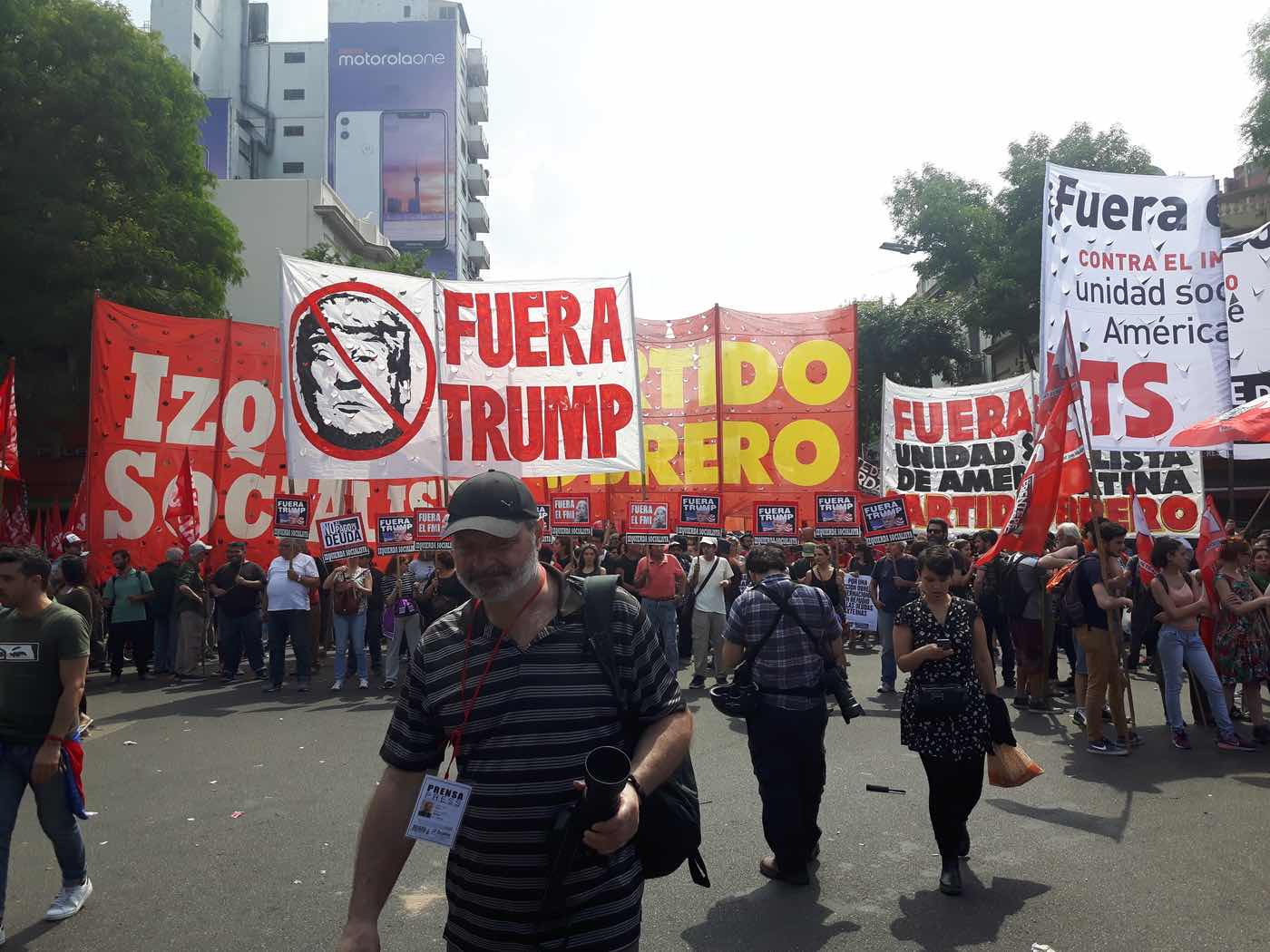

The Police
The police were conspicuously reserved during the demonstration, though present en masse in the background. An armada in battle formation had taken position in the streets behind the congress, generals giving each other military salutes in front of the troops. There was apparently a trained special unit of several hundred who were qualified for civil war. This unit had few similarities with European riot police and did not come originally from Buenos Aires—rather, it was an elite unit of the National Police, which one can imagine without hyperbole as armed anti-guerilla fighters.

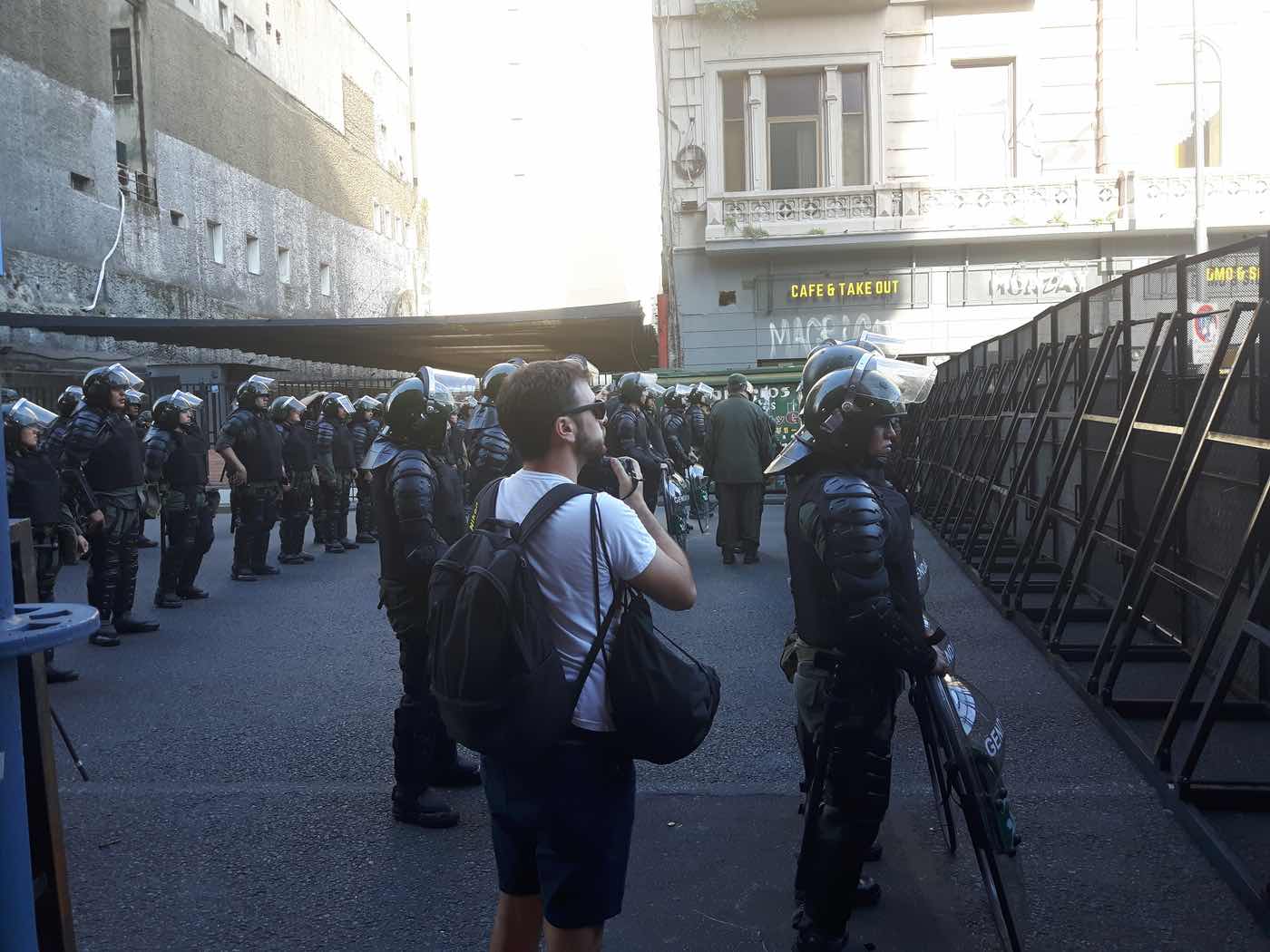
In the end, there was not a single concrete clash. However, some very young, alleged anarchists were arrested at the edge of the demo. They had allegedly wanted to distribute hammers and firecrackers in the demo. The media reported a news story about five detainees who had disregarded the Bullrich rules, including a leading Trotskyist. Moreover, the report included a video about 20 masked people at the edge of the demonstration, who were verbally and concretely rejected by other demonstrators.
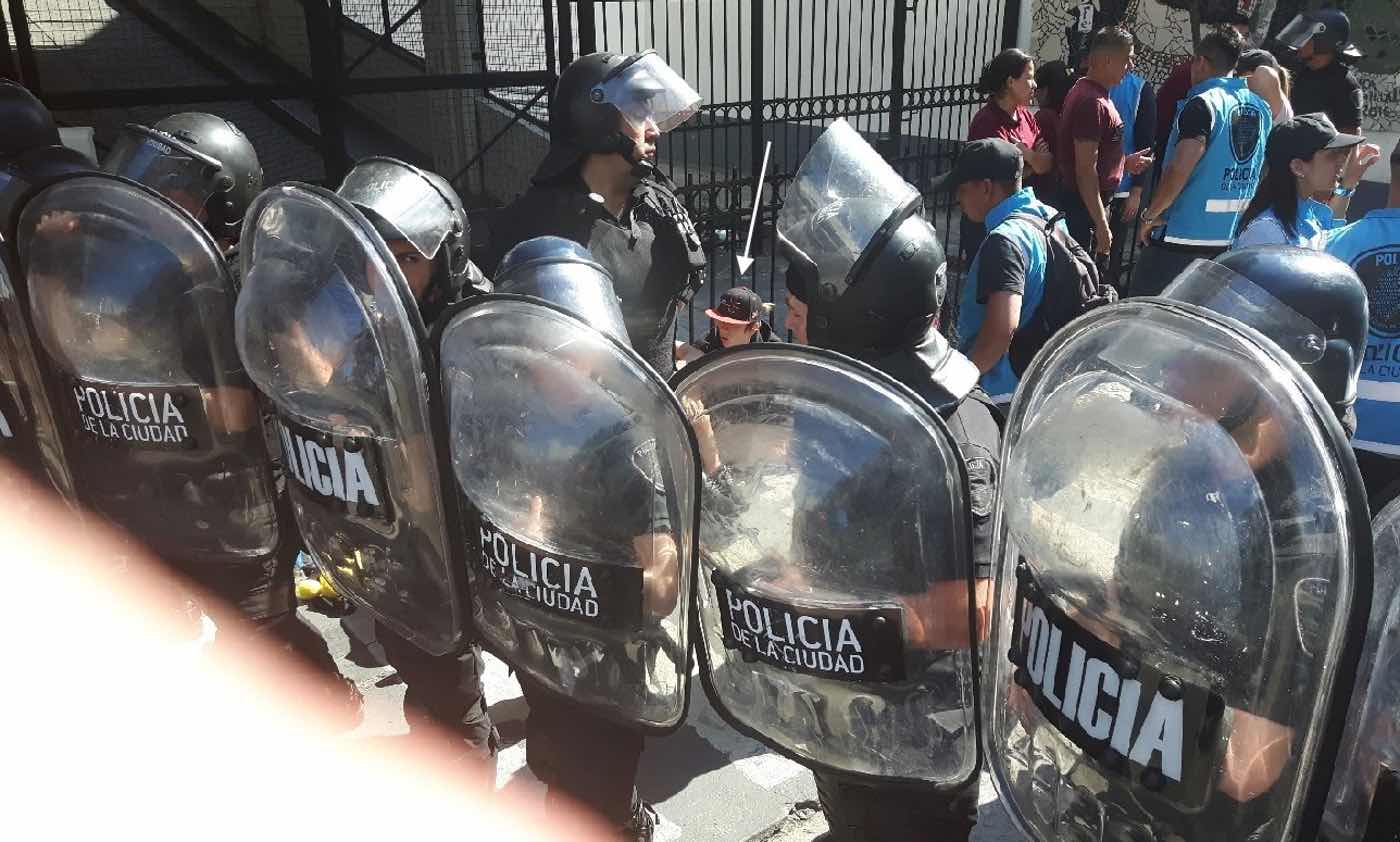
The Summit Highlight
The powerful celebrated themselves in the Teatro Colón, one of the oldest and most pompous cultural places in Latin America. The show, with 150 performers and a full orchestra, was reminiscent of an opening ceremony for the Olympic Games. Argentina, as the host country, presented itself with emotionally exaggerated kitsch as well as sensational stage and video technology. The heads of state applauded and Argentina’s President Macri was even seen crying. Of course, the show did not represent the reality of the country’s situation. Instead, even the Mapuche, an indigenous people who occupy a particularly precarious position in Argentina, were shamelessly tokenized and presented as “part of cultural diversity” with a virtuoso drum concert. There were also tango and gaucho performances and videos displaying nature and renewable energy plants. Football euphoria, on the other hand, as a logical additional genre, was probably removed at short notice and for understandable reasons.

At the end of the show, Buenos Aires high society cheered the state leaders who were sitting in the upper boxes. Trump, of course, interpreted this as directed at him personally and waved back majestically.

Security Zones, Corridors, and Convoys
The area immediately surrounding the Teatro Colón as well as a large zone around the venue were tightly sealed off, as were numerous streets surrounding the state guests’ hotels. There was a corridor between the demonstration meeting place and the Teatro that was also immediately adjacent to the relevant hotels; this ten-lane-wide Avenidas was was the main summit access route. Numerous convoys drove back and forth on the corridor. In some places, the route was sealed tightly, but in others there were breaks between the barriers where pedestrians were allowed to cross the Avendias. On some sections of the route, convoys drove at high speed without any police presence.
As an individual, it was even possible to get to the Teatro Colon without going through any security controls and to stay there for some time undisturbed. About 80 meters away from the Teatro Colón, hundreds of onlookers were gathered. Couples, families and tourists took photos, while kids played football—all in the immediate vicinity of heavily armed security forces who lingered around the barrier and in small groups in the area, wearing sunglasses despite the late hour.
Any blockade action would most likely have been dispersed quickly and violently. However, assassins camouflaged even half-well could have struck unhindered, and at several corridor sections even would have had a good chance at escaping. Considering the overall security hysteria, these were bizarre oversights, and they confirm the assumption that the security strategy was meant to prevent public protest actions; even the immediate security of state guests was obviously of secondary importance.

Protests End After the Demonstration
The security forces were relatively relaxed in the evening, as no further protest actions were announced following the demonstration. When the demonstrations dissolved at about 6pm, almost all the protesters left the center quickly and avoided going near the summit. There were no public discussions about direct disturbance actions, nor was there any public proposal to protest at the transportation routes or close to the Teatro Colón or the summit locations. Possible escalation of any kind was expressly avoided by the protest organizers. But, with few exceptions, there was also no spontaneous movement towards the summit.
Saturday, December 1, 2018
Summit of the World Powers
In general, the G20 summit focused on bilateral discussions. It almost seemed as if there was a kind of race between the heads-of-state to meet with as many other heads-of-state as possible, particularly the most powerful ones, in one-on-one talks. In this context, leaders abandoned their claimed goal of negotiating something all together, or really getting any results at all. It is not surprising that the more powerful participants in this kind of conversation always have the upper hand. Tactics like a pressure buildup or even coalitions of several weaker parties against one stronger party are impossible from the outset. As such, the summit was tailor-made for Putin, Trump and Xi Jinping.
The Joint Final Declaration was insubstantial and meaningless. It was easy to see through the pretense about a supposedly “hard struggle” to come together on this Declaration—no one even claimed it would have any binding impact on the future. It only happened at all so world leaders could avoid the embarrassment of ending the summit without a final declaration.

What is generally thought of as the most relevant summit result was the provisional postponement of various punitive tariffs, and thus the temporary defusing of the trade war between China and the U.S. This agreement occurred in bilateral negotiations. Trump described it as a “fabulous success”—but actually, the Chinese used the G20 to expand their sphere of influence across the board. This time, the focus was on Latin America. It was about long-term investments, large participation in entire economic sectors, commodity deals, and bilateral political agreements. Another significant event was that the US, Canada, and Mexico signed a newly-revised free trade agreement. The treaty was amended, at Trump’s insistence, to include passages prohibiting the parties from trading with countries that do not have a market economy as their basic economic system.

Solidarity Actions in Hamburg and Montevideo, Massive Riots in Paris
Hamburg, Germany
On the night of November 30, 2018, protesters egged the Olaf Scholz’s house and set the unoccupied guardhouse on fire (Scholz was Hamburg’s mayor during the 2017 G20 and is now the German Finance Minister and Vice Chancellor). In their statement, published in Spanish and German, the actors expressed solidarity with people of Buenos Aires, and especially with the anarchists who had been arrested two weeks before.
On December 1, after a St. Pauli football club home match, a small solidarity demonstration moved through the city center and a medium-sized rally took place in front of the pre-trial detention center where some prisoners from the 2017 Hamburg G20 protests are still being held.
France
On December 1, in Paris and many other French cities, there were street battles between yellow vest demonstrators and the police that lasted for hours. Europe’s most expensive shopping street, the Champs-Élisées, was largely destroyed, a great deal of looting took place, and a statue of Napoleon at the Arc de Triomphe was beheaded. There were also numerous arrests, and many demonstrators were injured.

The map shows the locations of the clashes and security zones (highlighted in red) in Paris on December 1, 2018. Pillages – lootings; véhicules incendiés – burnt cars; víolents incidents – violent clashes.
The scenes that many had expected in Buenos Aires were taking place in Paris. While France was rioting, President Macron was in Buenos Aires playing a minor role. The international press looked to Paris, as the G20 summit had become rather boring for them. In Buenos Aires, the dismantling of the barriers had already begun—in the middle of the summit.

Montevideo, Uruguay
Activists in Montevideo held a solidarity demonstration during which the French embassy was severely damaged.

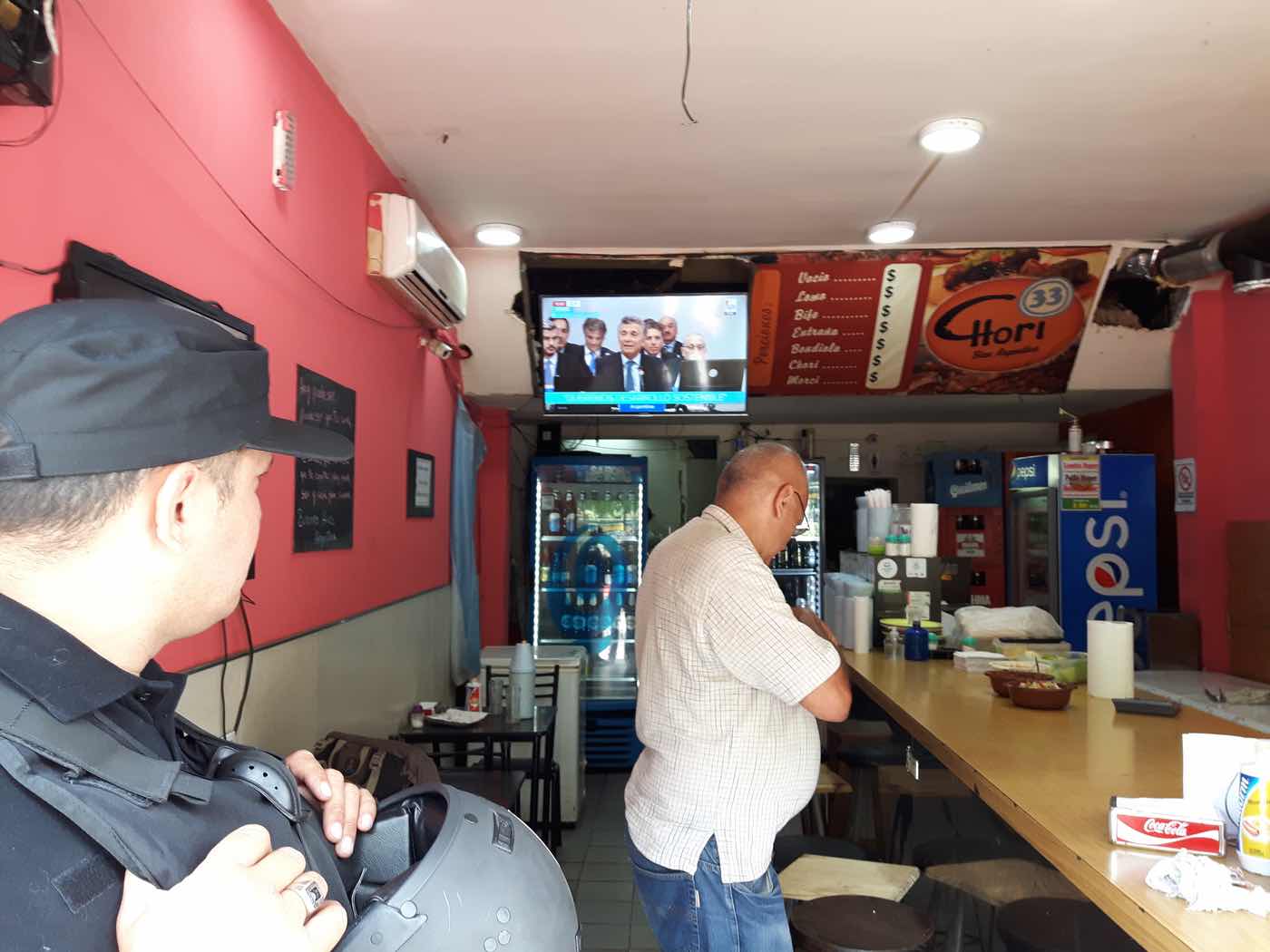
Conclusion: Ghost Town for the G20
What happened in Buenos Aires during the G20 was astonishing. The city pulled the plug. A special holiday was proclaimed, public transport was largely shut down, some districts and large parts of the city were sealed off, and residents were asked to avoid the city center and preferably to leave the city entirely during the summit. The state waged an all-encompassing security campaign against the main demonstration in order to show the potential for immense state repression and violence. As a consequence, even longtime political activists decided not to take part in the protests.
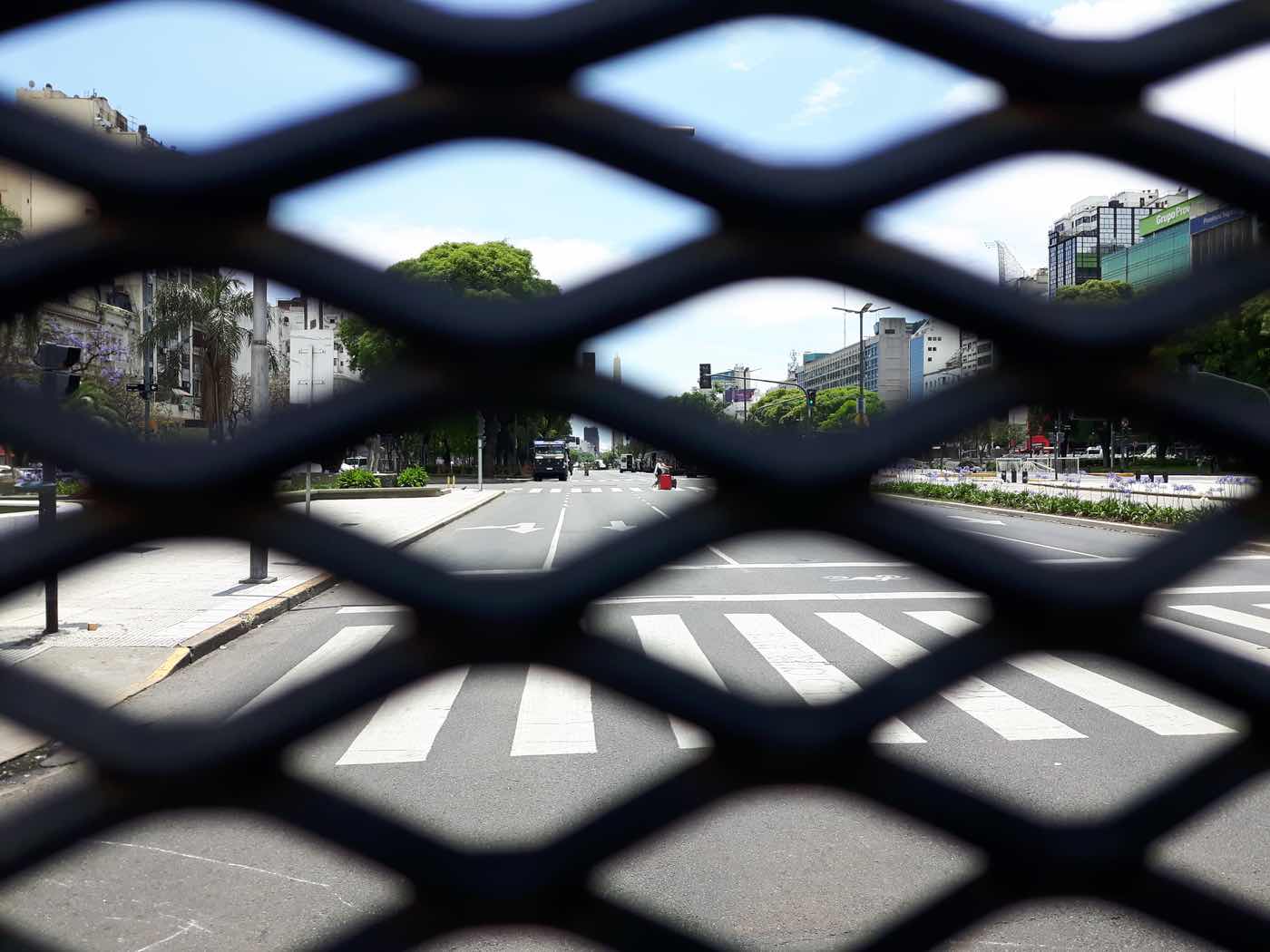
One could draw the preliminary simplified conclusion that the goal of taking to the streets to protest the G20 and the IMF was achieved. Yet the security calculations of Macri and the G20 successfully prevented bigger disturbances. Many demonstrators and residents of Buenos Aires were first and foremost relieved that the feared, even expected, bloody attacks by the police did not take place; there was no repression purgatory, even though the police probably would have needed little cause to intervene violently against protestors. Ultimately, the police were highly satisfied with the general course of the summit and their security strategy.
The G20 in Buenos Aires will go down in history as a summit without any great trouble. But the 12 (alleged) anarchists who were arrested before the summit have been hit hard. They are still in prison and will presumably be made to stand trial as scapegoats for all the protests that the G20 leaders and their security teams feared. The occupied house and the social center, which housed a world-famous anarchist archive, that were searched at the time of their arrest were immediately closed and sealed afterwards, and this is not even known to the public.

Further Reading
It is difficult to write a comprehensive retrospective assessment of what happened at the protest against the G20 in Argentina. The analyses that were written afterwards have offered widely divergent interpretations of the situation. Here we simply present excerpts from texts and interviews with individuals who are more familiar with the context and events that occurred.
Telephone interview with Gaby Weber
Gaby Weber is an author and journalist from Germany who has spent many years living in Buenos Aires and, previously, Montevideo. She has published on topics such as Nazis who fled to Argentina and current politics in Latin America, especially Argentina. She gave this 15-minute radio interview in German on the morning of December 1, 2018.
Moderator: Saturday, December 1, 2018. Today is the last day of the G20 summit. For those who do not know, the G20 nations represent two thirds of the world’s population and account for three quarters of world trade. The summit was held in Hamburg in 2017 and is being held in Argentina this year.
At the end of the G20, the participating nations present a final declaration based on what has happened at the event. But it’s questionable how reliable such declarations, which include deals countries have made with each other, are when powerful countries are not held accountable even to the standards of international law (see the breach of the Iran deal, the murder of Kashoggi without consequences, NATO, wars of aggression without consequences in the Middle East, and punitive tariffs instead of fair trade). On the phone, we now have Gaby Weber, live from Argentina. Ms. Weber, hello.
Gaby Weber: Hello.
Mod.: Ms. Weber, I want to ask very briefly about the venue of the G20 before we talk about the summit itself. Argentina is in an extreme economic crisis, the peso has fallen by 40 percent, and the government is dependent on loans from the IMF. I was told that 57 billion is now on the bill, the largest rescue package in the history of the country.1 Can Argentina afford the G20 summit? As far as I know, the summit in Hamburg cost over 130 million.
G.W.: The president since 2015, Mauricio Macri came to power promising to be a strong diplomat so as to distract from internal problems. In a way, he has succeeded. He was the host, so everyone was kind to him. People here haven’t been talking about everything that is going on in the country. Nevertheless, next Monday he has to show something for his efforts. Then, everyday life will start again.
“The demonstration was actually quite good, it was relatively well attended, but it was only the traditional left, so above all it was the Trotskyists who were there.”
Mod.: Ms. Weber, a big protest, which we saw in Hamburg during the G20, largely failed to take place in Argentina. There were a few people who took to the streets, but it was a minority.
G.W.: Well…the demonstration was actually quite good, it was relatively well attended, but it was only the traditional left, so above all it was the Trotskyists who were there. They brought a lot of people together; that is not in question. The problem was that they were left on their own. The trade unions, which are very big and powerful, expressly said that they would not take part—although perhaps grassroots organizers were involved.
And above all, the supporters of former President Cristina Kirchner, who had already done their own thing in the run-up to the event, said they would not take to the streets, that they were not even in favor of protesting against it now, that they had taken part in G20 meetings when Mrs. Kirchner was the head of the government. By the way, there was a very interesting interview with her former Minister of Economy Axel Kicillof 2 who suddenly said that they are no longer against the economy and against companies and that they will continue to work with the IMF in the future. Therefore, they explicitly asked their own followers not to take to the streets. That was all relatively quiet. The weather was also nice. The police had locked everything off and did not provoke the crowd. Therefore, everything went quite smoothly and no one deviated from the route. And well, you can say they announced their protest.
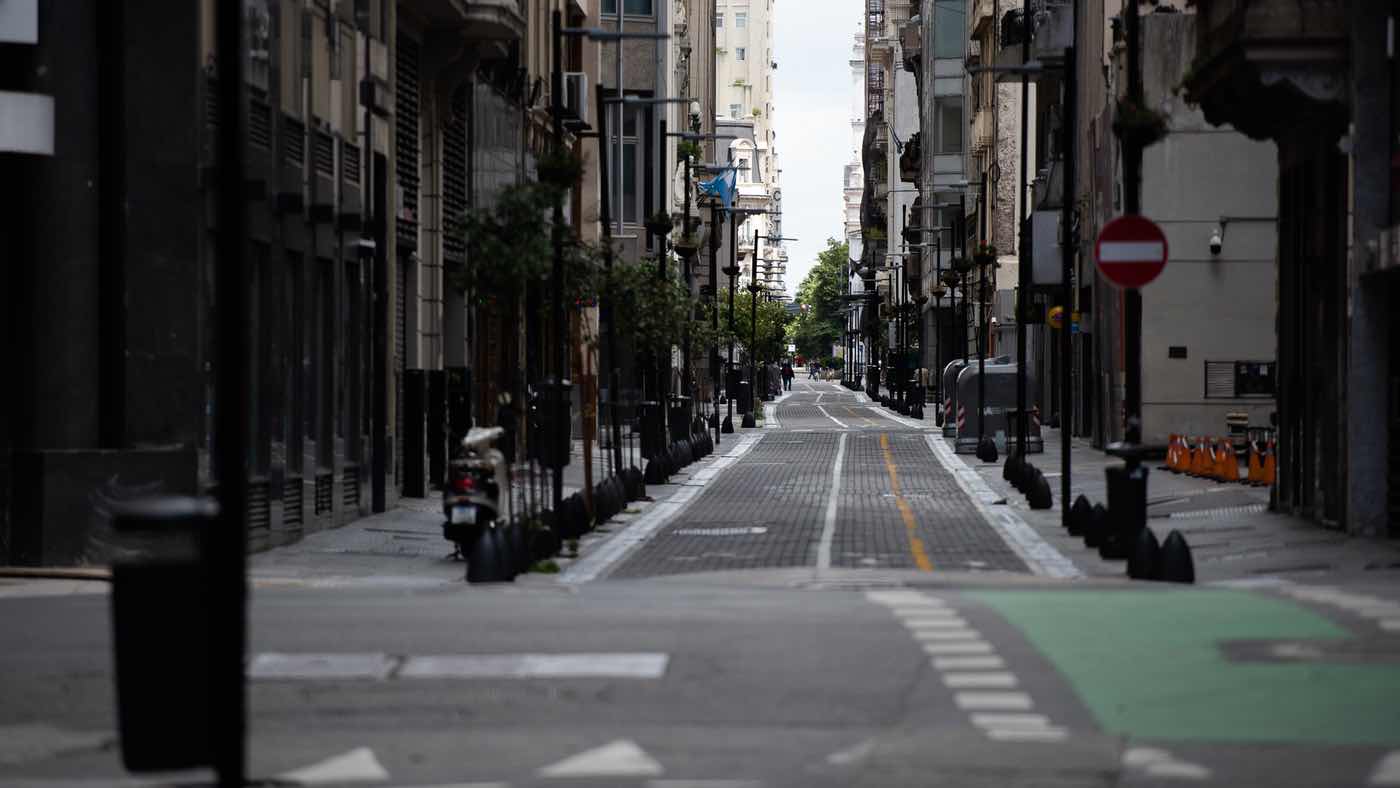
Mod: Would you say this is a sign of a great resignation? That people don’t think there is anything they can do against neo-liberalism anymore?
G.W.: Well, the normal population is pretty angry because the whole city has been shut down for several days for nothing. Because everyday people did not expect something big to happen here. Because the big problems—the big, global conflicts which require global solutions like poverty, migration, wars, and natural resources—they do not talk about them at the G20. In other words, what happens here has very little influence on everyday life.
Mod.: I would like to ask you more about that. Because the image of the G20 is that people are meeting precisely because of these big problems. Do you think that a meeting like the G20 has become a farce because the big players openly admit their egoism and confess it on stage? Do G20 meetings produce anything at all? Do they do what they pretend, or is it something completely different?
G.W.: I don’t think people have any expectations anymore. There was another meeting in Papua New Guinea two weeks ago. Trump’s vice president, Pence, was there and met with the Chinese president Xi. It was about customs duties, but they didn’t come to any result there either… Bolsonaro, the new elected president of Brazil, said he wouldn’t come3… Trump arrived here in a very bad mood… and there was no reaction here at all if you look at the pictures which is interesting. Or at least I didn’t see anything about it in the German media. The only person, the only head of state, who was picked up with all these military honors in Ezeiza [the international airport of Buenos Aires] was the Chinese president.
“…the Argentine government expects a lot from the Chinese president’s visit, but nothing from Mr. Trump.”
And of course, Mr. Trump noticed how he was being treated. He was pushed somewhat lovelessly into his car while Argentine soldiers in dress uniforms stood there and saluted Chinese President Xi. So the Argentine government is expecting a lot from the Chinese president’s visit, but nothing from Mr. Trump, because there were also no signs at all in the run-up to the G20 that he was looking for any agreement.
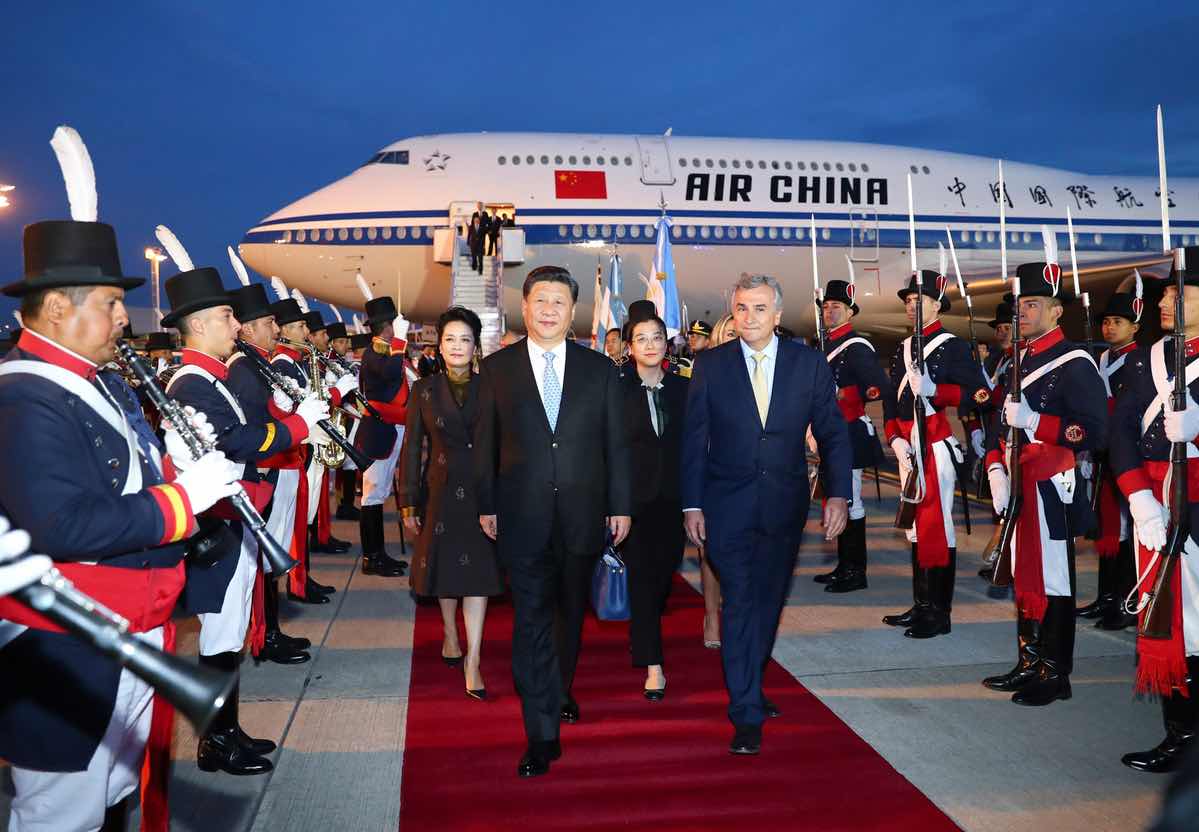
Mod.: Actually, the G20 meeting, at least here in Germany, filled the gossip columns. Merkel arrived extremely late due to an aircraft breakdown, “MBS” (Mohamed Bin Salman) exchanged this hip hop greeting with Putin, and China demonstratively stood behind Saudi Arabia. They just want to continue buying oil from Riyadh at a low price. This is what we’ve seen here in Germany. However, were there any agreements made on the most pressing issues? For example, are there now binding agreements on climate protection? Is there anything there?
“The summit is primarily about investment… climate, migration, poverty—these issues are not the point here.”
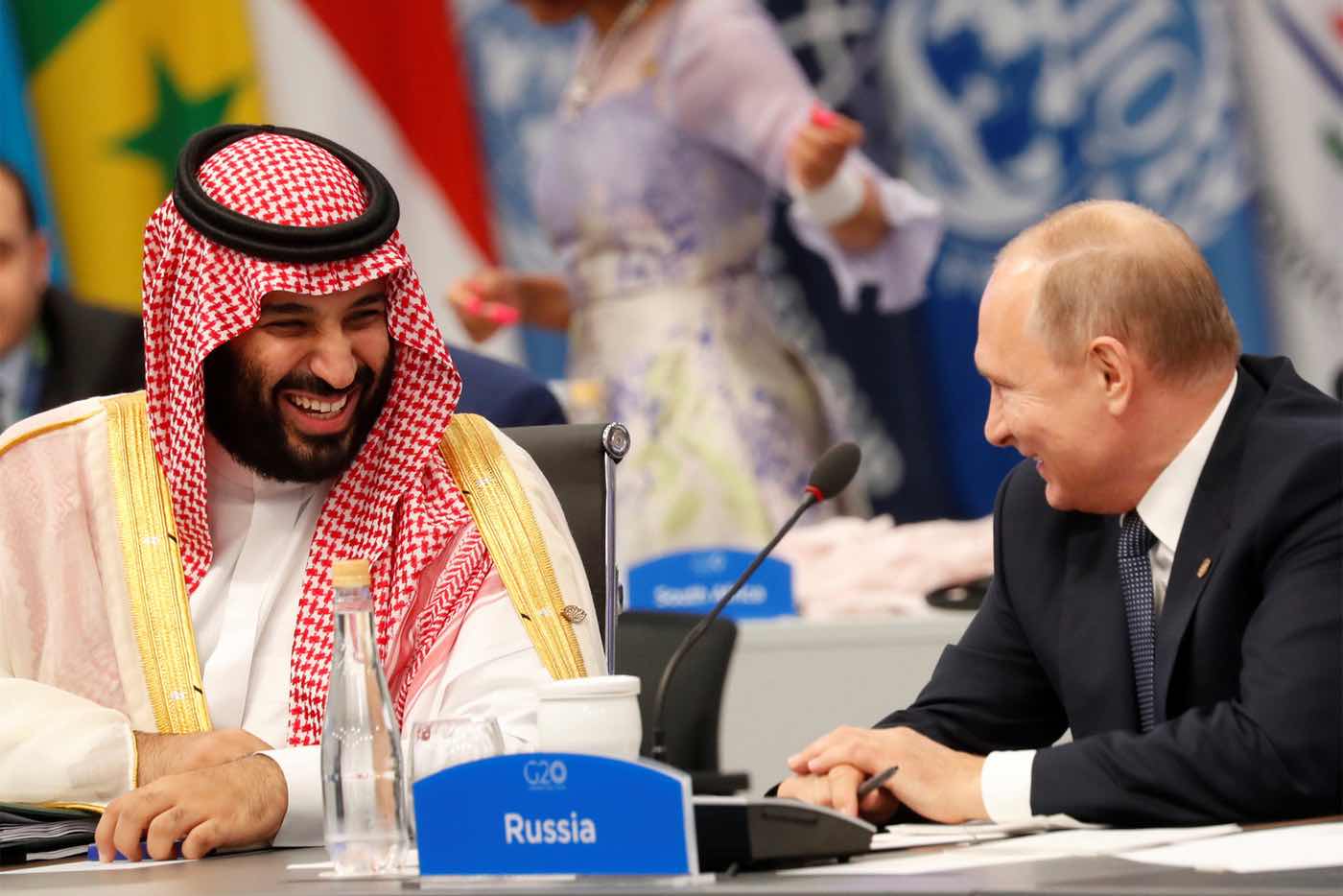
G.W.: Well, so far the issue of climate protection has not been mentioned at all. The summit is primarily about investment. Private companies have also been invited, which are of course now spreading optimism because the Macri government has set a new course. However, climate, migration, poverty, that is here actually not the point at all. As I said, it is about - what they say, or what participants admit - the barriers to trade, in other words the tariffs that are threatening. However, there is no indication at all that anything is going to happen on these subjects here.
“The new free trade agreement between the USA, Mexico and Canada prohibits the three members from trading with countries that do not have a market economy.”
If you look at Mr. Trump’s agenda alone, the first thing he did before he even arrived in Argentina was to cancel his meeting with Putin. Yesterday he signed a treaty with Canada and Mexico, the so-called follow-up treaty for NAFTA. Mexico signed the deal on the current Mexican president’s last day in office, because supposedly the new president, Lopez Obrador, though he wanted an agreement with the USA would not have signed the treaty based on what it contained. And what no one has written about is, if you take a look at the text of the treaty, you will find an article that forbids the three members to trade with countries that do not have a market economy. It says that if you want trade with a country, if you want to exchange goods or services with countries that do not have a market economy, then you can no longer do business with us. That, of course, is directed first against the Chinese, against the People’s Republic. But I do think that, in the current situation, we have to ask ourselves whether European agriculture is still a market economy. I believe it is no longer a market economy. This provision can be interpreted very broadly and the new Mexican president would not have signed it. But Trump had to listen to Mexico and Canada when the agreement was signed. So on tariffs, we have to talk again about aluminum and steel.
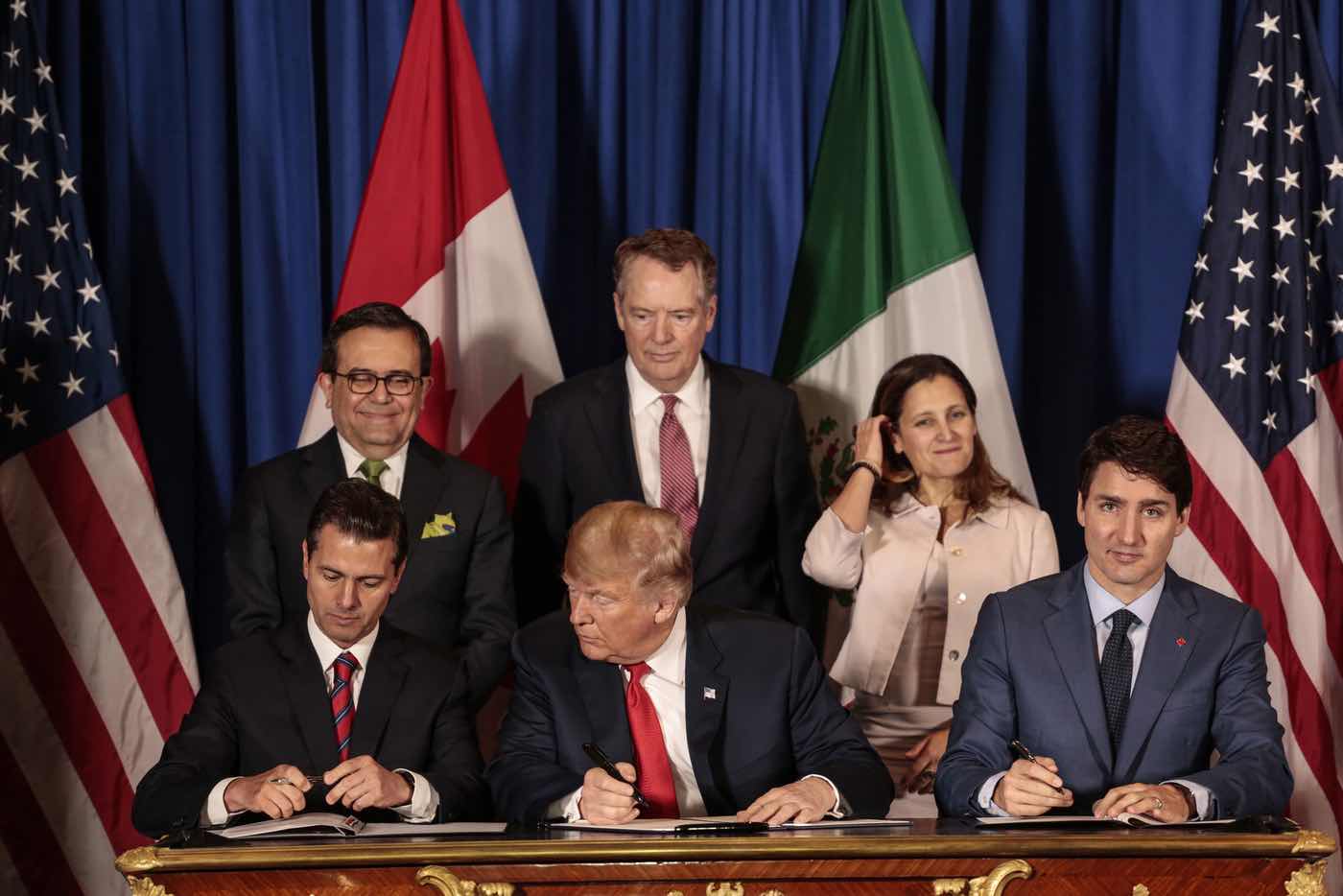
Mod.: Let’s go over this very briefly. If you talk about a market economy, the kind of agriculture and market economy that we operate here in Europe is highly subsidized and destroys the competition because it is completely unfair. I think that this kind of agriculture, this export to the African region, also generates refugee flows. But let us briefly touch on the issues. You can give me a yes or no although I probably already know the answers. The trade dispute between China and USA, the punitive tariffs. Has it been mentioned and is there a result?
G.W.: Not yet. It’s noon. So in half an hour, Trump wants to meet Merkel, and in the evening or the afternoon there should be a meeting between Trump and Xi. But after that, Trump wanted to leave immediately. If they expected any agreement then they would have left at least a small time window open in their timetable for a joint press conference. But that hasn’t happened. Anyway, there were fights here because Trump was constantly quarreling. Excuse the word, but even the Argentinians were unable to find another term for his behavior. Trump’s spokesperson, Ms. Sanders, made a statement accusing the Chinese of predatory economic activity. Well whose mouth is that coming from? And for the Argentinians, the Chinese, as I said, are the most interesting trading partner at the moment, and so there have been more quarrels with Trump.
Mod: The United States and Donald Trump, this financial elite, just does not want to accept that there is another big player who is leaving the U.S. behind: China. But at some point it will dawn on them that the train has left the station. Let’s talk about international terrorism. That should have been an issue at the G20. Do you know anything about that?
G.W.: I haven’t heard anything about it.
Mod.: Was there any discussion of the situation in Syria or Yemen?
G.W.: Of course, we don’t know what happened in the bilateral talks. But it was not a public issue, so as I said, you mentioned it yourself before, the man from Saudi Arabia was celebrated here, from all sides.
Mod.: Was there any discussion about preventing the next big financial bubble from popping, i.e. did anyone talk about cryptocurrency? Has anything leaked?
G.W.: Not at all, and if you look at which private companies were invited, companies like J.P. Morgan, there is nothing happening on that front.
Mod.: (laughs)…I have to keep asking. In a few days, the world will meet in Morocco regarding the migration pact. Were there any signs that this was discussed?
G.W.: No.
“When a final declaration is made, it’s going to be vague.”
Mod.: Not even…Merkel met Putin immediately after her late landing. We assume it was about the incident in the Sea of Azov.4 Has there been any indication that they want to reach an agreement in order not to escalate things in Ukraine again?
G.W.: Absolutely not. I suspect that Ms. Merkel will consult with other people before there is an explanation, but it won’t come here in Argentina. It is said that the G20 is currently working on a common declaration—if that happens, it will be vague. At the moment there is no indication that any agreement has been reached in regards to any of these problems.
Mod.: Do you think there will be a joint, binding declaration from all the heads of state signed at some point?
G.W.: There should at least be something about the Paris climate treaty. It’s already clear that the USA is outside the treaty, and Brazil doesn’t want to go along with it either. It’s already clear that they’ll want to avoid that. And at Customs, Trump said that he was not willing to make any gestures towards the Chinese. He gave very nasty remarks here. He also put his earphone on the floor in front of the cameras because he didn’t like what was being translated… you just don’t do that.

Mod.: He was that rude?
G.W.: It’s not the first time he’s done that. He has no interest in working with the other people who are here.
“I think they have to come up with something new.”
Mod.: Ms. Weber, if I may summarize what we discussed the last quarter of an hour: The G20 meeting is an admission that international politics and diplomacy are bankrupt, and that in the future we will again have to adapt to war as a means of realpolitik. Is that fair to say?
G.W.: Well, what we are talking about here is a new cold war. For example, the treaty that Trump forced on Canada and Mexico is a kind of exclusion—a declaration, so to speak, that they will no longer trade with countries that do not have a market economy system. That is clear blackmail, similar to what has already happened with Iran. The definition of countries that do not have a market economy system can be interpreted very arbitrarily. The atmosphere has changed; they have little willingness to talk to each other at all. So I think they have to come up with something new. Things didn’t go so badly for Argentina. As I said, on Sunday, when the G20 summit is over, dozens of trade agreements will be signed with the People’s Republic of China. So, they have big plans, and Trump was of course very upset that he had no success at all.
Mod.: Wouldn’t the summit be better if it was carried out as a G19 summit, i.e. without the USA next year, so the countries achieve something instead of inviting someone who is actually just boycotting?
G.W.: Well, the USA is still the largest economy in the world, with a huge military apparatus. I think they should keep trying but go through other channels because with Mr. Trump it obviously won’t work.
Mod: Ms. Weber, thank you very much for this interview and finally a very private question: what sort of perspective do you have to have to comment on all these topics?
G.W.: The problem is that it has become very illogical and very confusing and so many interests are involved. Basically, you have to describe all interests from all perspectives in order to understand the whole thing, and in the end, you still don’t understand it.
Mod: You have been in this business for a long time. Have you ever experienced a situation similar to the one we are seeing today? Or is this a completely new situation such that we don’t really know who we are dealing with and what the future holds?
“We journalists have also been treated very badly. There is no internet, not even in the press center.”
G.W.: What’s really new is the way the summit has occurred here in Argentina. It is nothing new that we as journalists don’t get informed at all. It is not the first time; it has always been this way, and afterwards, at best, something leaks out. But in the past, people at least remained polite. Also, we journalists have been treated very badly. There is no internet, not even in the press center. There were no official announcements. They actually want us to understand that we are not wanted here. And then the style of world leaders, like Trump and Bolsonaro, is no longer even minimally polite. We see this also in the fact that someone has been invited here who has been severely reproached for giving the order to murder a critical journalist and for having him dismembered. I do not know whether Ms. Merkel will still shake his hand when they cross paths.
Mod.: If the oil quality is okay, maybe she will. Ms. Weber I thank you for talking with me. I wish you a nice, and indeed a little bit warmer, day than the one we are having in Berlin. There was a climate demonstration here in front of the Chancellery, I don’t know if that will be noticed. Have a beautiful day in Argentina.
Conversation with Sebastiano, a Convinced Leftwing Peronist from La Plata
One of the big question marks after the summit was the role and attitude of Peronists. They still have widespread support, or at least a lot of people who identify as members of the movement. On the other hand, the Peronist movement includes people with extremely diverse viewpoints. As such, it is important to note that the conversation with Sebastiano by no means reflects points of view that all Peronists share. However, many of the ideas he expressed have been shared, confirmed, or expressed in similar ways by others from the Peronist context.
Jan: Hello Sebastiano, great that I can get to know you a little bit. We are interested in your perception of the G20 protests and your assessment of the situation in Argentina and Peronism. Me, myself, I am, as you know, a freelance journalist. I am trying to understand the G20 events here in Buenos Aires. I’m taking notes on our conversation which I will publish later without clear names. Is that OK for you?
Sebastiano: Hello Jan.5 Sure. Why are you interested in Argentina, Buenos Aires and the G20 here? You are from Hamburg in Germany, aren’t you?
Jan: Yes, exactly… and we had the last G20 in our town, with quite violent police attacks but also diverse protests. At the moment there are still several activists in prison for this. Apart from that, I am interested in Argentina, Buenos Aires as well as generally in Latin America for political, but also for banal personal and family reasons.
Sebastiano: I have never been to Europe. As an employee in the state administration with two children, I could not afford that even before the current crisis. Besides, my English is miserable.6
Jan: Where exactly do you work and how much do you earn there?
Sebastiano: In the administration of the province of Buenos Aires, in La Plata (the largest and most populous province in Argentina, inhabited by 15.6 million people). There, I am in the department responsible for coordinating with the Buenos Aires Capitol administration about overarching infrastructure like traffic. I am often here in the city to clarify things or to apply for grants for projects in which the Capitol has or should have an interest. I am in the upper middle rank and earn a little less than 34.000 Pesos.7 That’s not so bad for Argentina. But for us, everything has become enormously expensive.

“The greatest need is in the densely-populated periphery of Buenos Aires where over 10 million people live.”
Jan: The provincial governor is a partisan of Macri, just like the mayor of the Capitol—how well does that work?
Sebastiano: It works quite well for the rich. But there are very few of them in our province—usually they are big landowners. They have been given generous tax breaks. For the rest of us, things are going downhill. The greatest need is in the densely-populated outskirts of the Capitol, which belongs to our province and where over 10 million people live. People there were not doing very well even in Cristina’s time8—but at least then, there were numerous social programs that absorbed the worst to some extent. In addition, we directly supported every kind of economic self-organization. But for some time now, hardly any funds have been made available for this.9 In the administration, however, there are still many people from the Kirchner period 10 and we do what we can, including unpaid voluntary work for social grassroots organizations.
Jan: Will the national budget that has just been decided further aggravate the situation?
Sebastiano: Most likely. They are cutting our province’s last resources. But pensioners, workers, the unemployed, and educational and cultural sectors are also hard hit. And for many decades now, the loan from the IMF has to be paid off, which includes including high-rated interest. This makes Argentina directly dependent on these sharks and there is hardly any wiggle room.
Jan: Why did even some diehard Peronists vote for it?
Sebastiano: Good question. I think these people have been corrupted and won’t make it onto any of our movement’s electoral lists again…
“The great majority of intellectuals, as well as the wage earners, understand themselves in a Peronist context.”
Jan: The Peronist movement is, speaking diplomatically, heterogeneous.
Sebastiano: You can go ahead and say “split.” But the differences are not new, nor have they only appeared during the budget vote. On the other hand, there is no real alternative than us to the Macri and Bullrich system. We are indeed bad and dirty on the one hand, but on the other hand, we are the social and human Argentina. It is not for nothing that the vast majority of intellectuals and wage earners understand themselves in a Peronist context. But it is also a bit like a family with terrible uncles, mean mothers-in-law and stupid cousins.
Jan: Well, your father figure Juan Domingo Perón also granted asylum to thousands of German Nazis and other European fascists after the war, and when he had to leave into exile, he went to the Spanish dictator Franco.
Sebastiano: I know, too, that Perón was a militarist through and through, and he represented widespread views there. But I don’t want to apologize for that.
Jan: Has that ever been critically reviewed in Argentina?
“Today, we Peronists are, without exception, convinced anti-fascists.”
Sebastiano: A difficult topic, because this very necessary processing was often demanded by people who are socio-politically oriented near to right-wing circles. These campaigns were always directed against the policy of social equality and justice implemented by Perón, the improvement of the immediate living conditions of the poorer sections of the population, free access to education, and basic health care. Because of that, decisive political structures within Peronism have automatically blocked this critical consideration for a long time. However, during the Kirchner era this stigmatization was slowly dissolved. Of course, today, we Peronists are, without exception, convinced anti-fascists. Nobody in Latin America doubts this.
Jan: How do you evaluate the course of the G20 summit, in particular the protests against it?
Sebastiano: First of all, like all Argentinians, I was very relieved that there were no dead. That seemed to be the most probable option given the threats made by Security Minister Bullrich, which were unequivocal. I compliment the organizers of the demonstration, who did not allow themselves to be provoked, and acted very responsibly. On the other hand, there were far too few on the streets in view of the social crisis, which has a lot to do with the G20 system. Militarized deterrence and the cancelling of transportation in the city center had its intended effect. However, I myself was present at the demonstration, although my wife wanted to stop me. We and several others came from La Plata in private cars.

Jan: There were no buses?
Sebastiano: The police had previously called many bus companies and explained that the whole city would be sealed off and that, in general, a very complicated situation was to be expected. As a result, only completely overpriced buses would have been available.
“It was made clear to high-ranking trade union officials that they would be held accountable if the situation escalated.”
Jan: It was mainly the Peronist camp that reduced the mobilization, wasn’t it?
Sebastiano: That’s true. The big unions in particular saw the danger that if a certain critical mass were to take to the streets, the escalation would inevitably come. Many functionaries simply did not want to, or could not, risk that. In addition, there was direct pressure from the government on key structures. And finally, various Trotskyist parties had so appropriated larger parts of the protest in terms of content that for us, the proponents of massive participation as Peronists ran out of arguments internally.
Jan: One after the other: What was the concrete pressure of the government like?
Sebastiano: High-ranking trade union officials were made unmistakably aware that they would be held accountable for any escalation. Moreover, a few weeks before the summit, there were direct talks between IMF representatives and the CGT11 leadership. The latter was able to save some fundamental trade union rights and then withdrew in the mobilization against the IMF as well as against the G20. They also cancelled the general strike that was planned to occur shortly before the summit. But fear was also deliberately stirred up in our other grassroots organizations and in the social movements in general. This happened in particular on the outskirts of Buenos Aires—where the need is highest, but where there is also a widespread susceptibility to apocalyptic rumors.
Jan: For example, you mean the two CTEP activists who were shot?
Sebastiano: Yes, the murder of the two of them had a profound effect in these very precarious barrios. It was precisely there that rumors of further deaths made the round. Facebook was used to spread the rumor that security forces had orders to shoot fiercely at the demonstration at the first opportunity, and that the military would be ready if necessary. From 1500 hospital beds made available for the summit, Facebook quickly reported that the government expected up to 1500 dead.
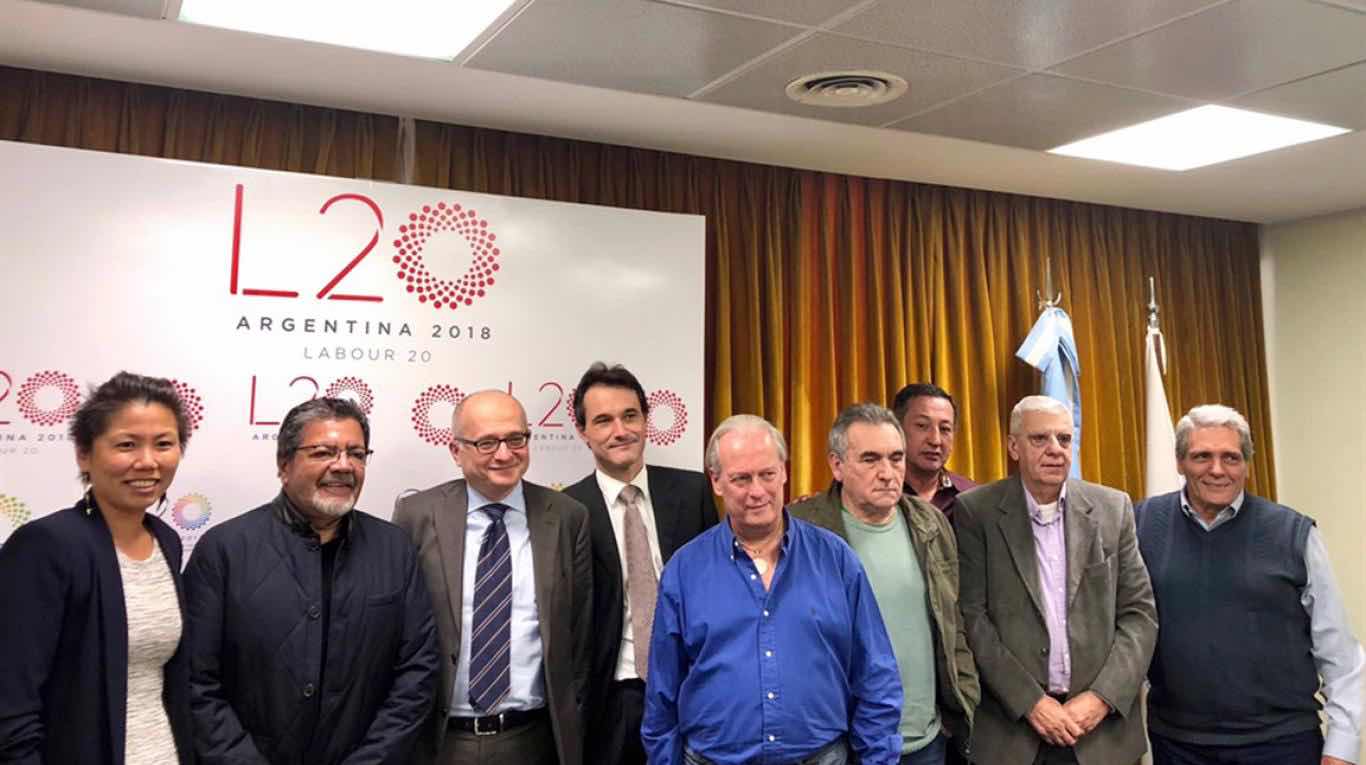
Meeting of the CGT leaders with IWF representatives, November 15, 2018.
“The Argentine secret service has been busy for months trying to prevent uncontrolled mass protests.”
Jan: Have these rumors been deliberately put into circulation?
Sebastiano: Many say exactly that. The Argentine secret service—this is undisputed—has been busy for months trying to prevent or fight uncontrolled mass protests during the G20. They feel they are entitled to use any means necessary. Incidentally, the secret service is a sector to which we Peronists never had real access again after the military dictatorship—there are nasty, right-wing radical, Mafia structures romping around and the CIA is also on board. Patricia Bullrich is, by the way, seen as the hand of the secret service in the Macri cabinet.
Jan: Aha, where does that come from?
Sebastiano: A bizarre story of bloody betrayal in the context of the Montoneros, in the beginning of the 80s. Bullrich and her sister were also involved; her brother-in-law was even one of the leaders. These children from the Argentinean upper class are said to have been smuggled in on behalf of the secret service and to have betrayed the entire structure of the guerrillas, which finally led to thousands of murdered people. Patricia Bullrich, on the other hand, made a career as a security expert and finally as a minister. Her special project is repression in Patagonia against the protest of the Mapuche Indians. The Bullrich family also has huge estates there and corresponding economic interests. The secret service leads a dirty war for the rich and against the people.
Jan: The Maldonado case12 got a lot of international attention. At that time, a little more than a year ago, about 500,000 people took to the streets in Buenos Aires…
Sebastiano: Yes, and the demos were also directed directly against Bullrich, the police, and the secret service. In my opinion, this mobilization was the most politically powerful in the recent past. But this also came about because Maldonado came from Buenos Aires and a middle-class family. There were many indigenous people in Patagonia who were murdered before Maldonado was and whose deaths didn’t spark any major protests. With Maldonado, however, in addition to the usual people who show up for demos, the Buenos Aires liberal white middle class took to the streets on a massive scale.
Jan: And that didn’t happen with the CTEP activists who were shot.
Sebastiano: Yes, indeed. There have only been a few 1,000 on the streets. Admittedly, the demonstration was on a morning during the week, when most work. But the one from Matanza was also Bolivian, and the one from Cordoba was from a subproletarian milieu and had been officially unemployed for a long time. But bourgeois Porteños [residents of Buenos Aires] obviously don’t take to the streets in masses, and there has been no mobilization in the progressive cultural scene—in contrast with the case of the white, educated do-gooder Maldonado.
“The attitude of the cultural scene was rather reserved.”
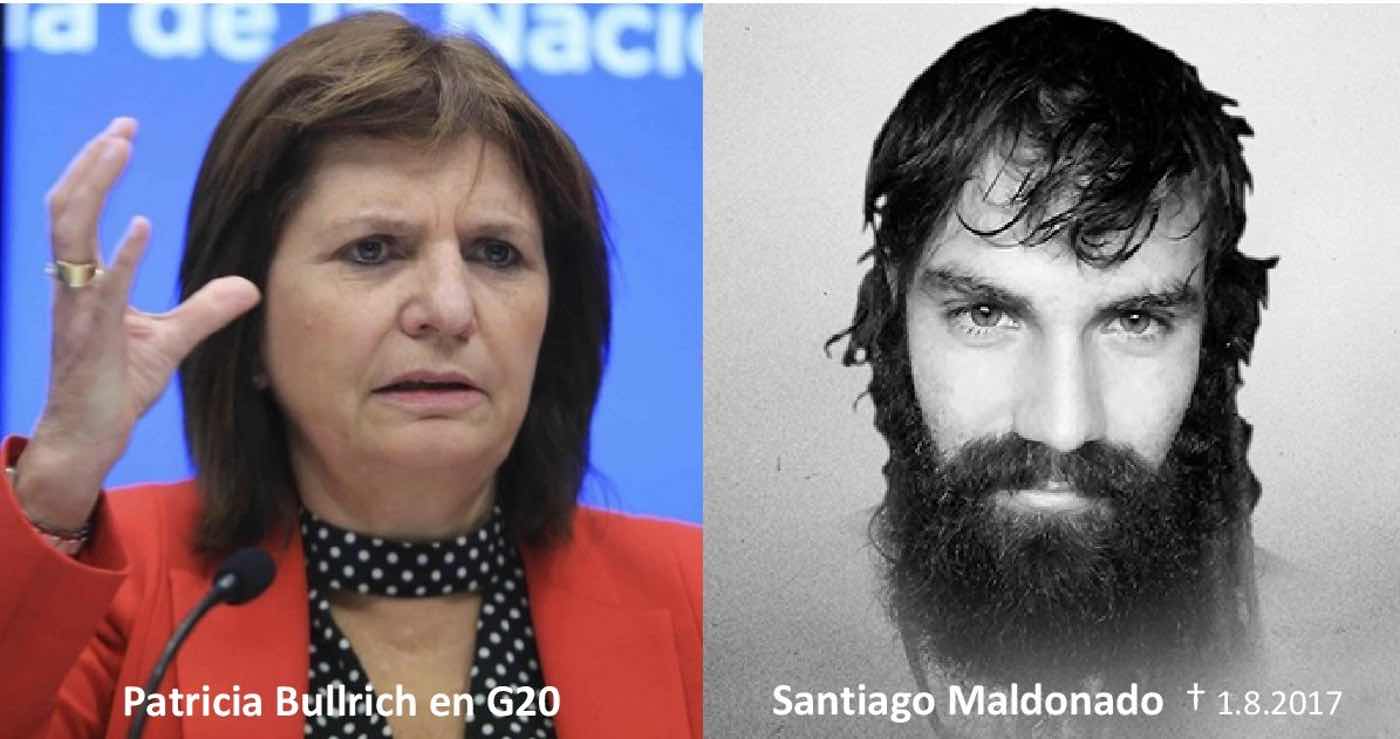
Jan: Speaking of the cultural scene, what was their attitude in regards to the G20 protests?
Sebastiano: I would say rather reserved, almost neutral—at least not very active. As far as I know, there was only a very manageable weekend event in advance.
Jan: Why?
Sebastiano: Well, actually there was also protest music at Clasco and during the counter summit at Congress Square. But a larger campaign was missing. In my opinion, the reasons for this lie in the composition of the protest alliance, which seemed to have relatively little connection to this scene. Large parts of the cultural scene feel closely connected to Peronism, and if we don’t join in a united way then they won’t do much either. Moreover, the Trotskyists are unprecedented cultural oddities that always drum up the same rhythm at the demos. Those who really want to embarrass themselves in the cultural scene join them. Do Trotskyists still exist in Germany?
Jan: As far as I know, only very few, mostly older people, maybe 100 or 200 in all of Germany. Most Germans don’t even know who Trotsky actually was. But also, the traditional orthodox Left in Germany is extremely weak. Are the Trotskyists in Argentina so numerous and politically important for the anti-G20 campaign?
Sebastiano: Unfortunately, yes. They also have real support at several universities. Sometimes I think that 90% of all Trotskyists worldwide have gathered just in Buenos Aires. And we—the Peronists—are their declared first favorite enemy. When alliances are formed, they compete against us with monotonous reproaches for alleged reformism. In elections, however, they are left empty-handed because they are constantly splitting up and have little support among the working class and in the barrios. However, they are very strongly represented in street mobilizations and are popular with many young activists. Those who don’t have to work—and there are often many of them—go to every demo.
“Dominant Trotskyists, divided Peronists, determined feminists.”
Jan: Do you think that without their prevalence, more people would have come?
Sebastiano: It is not so simple. But I can say that Trotskyists have dominated the scene in regards to the G20—in contrast to mass protest and resistance. But as for why that came about, it is much more complex. Our internal Peronist ambiguity and the insane threat of violence were certainly much more important in the overall view.
Jan: The alliance “Confluencia” was, on the other hand, very open to everyone. Why didn’t you get involved more?
Sebastiano: Well, there were several Peronistically-oriented organizations involved. But a mass participation was not easy for many of us. That wasn’t only due to the “evil Trotskyists”—they only participated in the Confluencia…In my opinion a smaller, mainly feminist-oriented group with an internationalist orientation was decisive. Their mobilization was based on the very strong women’s movement last March. But that wasn’t so easy to transfer to the G20, and so the static Trotskyist camp gained weight. We were pretty much on the outside and argued internally instead. In any case, we missed a unique opportunity to draw attention to the social situation in Argentina, Buenos Aires, and all of Latin America worldwide, given by the presence of the world press. Bullrich and Macri cheer—it couldn’t have gone better for them. On the other hand, however, we were not beaten to death.
“The summit itself has only brought further setbacks and has further cemented the neoliberal world order.”
Jan: Did the G20 result in anything positive for Argentina or Latin America?
Sebastiano: First and foremost, the Chinese continued to buy our remaining economic silverware. Trump had his show. Macri was able to score with his tears at the Teatro Colón. Your Merkel, on the other hand, seemed for many Argentinians to be the last bastion of international and moral common sense. But the summit itself only brought further setbacks and cemented the neoliberal world order.
Jan: What’s going on in Argentina now?
Sebastiano: It’s hard to say… Now there are new, tighter laws that were already in the drawer before the G20: for instance, regarding the use of firearms by the police, subjectively-perceived threats now suffice as justification. And in December we had a lot of protests in the last years under Macri because then many people will be fired and also because of that many can’t afford a dignified Christmas. Probably then the enormous tear gas and rubber bullet reserves saved by the G20 will be used for the first time.13
Jan: What do you think politically is most important for the near future?
Sebastiano: Well, we just have to win the next elections in 2019 and then the wind will turn decisively in our direction. We do not need an international public for that either. Rather, this will be decided here on the ground and requires all our strength as well as an overarching unity of forces against the neoliberalism of Macri and the G20 system.
Jan: Who then will line up for the Peronists?
Sebastiano: I think Cristina Kirchner would have the best chances—above all because of her popularity in the poor belt around Buenos Aires. Personally, I am committed to her renewed candidacy.
Jan: Last question: Macri and company obviously have good connections to the football club Boca Juniors. I’ve heard that River Plate is controlled by you Peronists—is that true?
Sebastiano: This is absolute nonsense and has been put into the world by the conservatively-dominated media just like the corruption accusations against Cristina.
Jan: But you don’t deny that there was also corruption during the Kirchner period…
Sebastiano: Did I leave a quixotic personal impression here?
Jan: Nope, all right. Many thanks Sebastiano for the really very informative and intensive conversation… and have fun with your Trotskyists there.
Sebastiano: You can take them all with you to Hamburg—from there they wouldn’t have to go so far to Russia to straighten things out again there.
Argentina, the G20, and the Mobilizations against it
by Marta Musić, published on December 10, 2018.
Marta Musić comes from France, has lived in Argentina for half a year, participated in the Confluencia, and was an international representative for ATTAC. She has published this review and analysis in English and Spanish, and it has also been translated into German. The text is an authentic insight into the development and orientation of the protest alliance, but it is not an official statement of the Confluencia.
As we enter a new phase of authoritarian neoliberalism, it is essential that we continue strengthening ties between movements fighting these structures of oppression, and that we continue to advance in our construction of better worlds.
In response to the catastrophic Buenos Aires G20 Summit held November 30-December 1, 2018, the Confluencia Fuera G20-FMI organized a week of action to repudiate the presence of the G20 and the IMF in Argentina with the goal of creating spaces of convergence where demonstrators could continue building grassroots alternatives to neoliberalism.
This week of action was an achievement nothing short of inspirational considering the advance of neo-fascism in the continent, the increasing repression and criminalization of social movements, the militarization of territories, and the exhaustion of a fragmented Left following Latin America’s progressive cycle.
The G20: A Farce That Is No Laughing Matter
As expected, the G20 Summit final declaration did not provide any groundbreaking solutions to address the systemic crises we are currently experiencing—and for which the neoliberal policies of the G20 countries, the IMF, and the transnational companies they support are directly responsible.
To cite just one example, the measures decided by the G20 countries—responsible for 78% of emissions of carbon dioxide in the atmosphere—will actually exacerbate climate change. This is especially ironic given this year’s G20 slogan: “Building consensus for a just and sustainable development.”
Local media turned the summit into a laughingstock by reporting on several diplomatic snafus including the official Argentinian delegation arriving late to greet Macron—who began shaking hands with the airport staff wearing yellow vests (imagine the irony)—on the tarmac, while another Argentinian delegation mistook Xi Jinping as a member of his staff. Merkel arrived a day late after her government plane broke down and Trump incessantly humiliated Macri who was desperately trying to get in his good graces.
The cherry on top was probably the Wi-Fi collapsing during the press conference, attended by 2,500 outraged international journalists, held the first day of the summit.
“The G20 summit did not just leave behind disastrous environmental policies, funny memes and a hole in the public budget. It left Argentina much more militarized than before.”
As laughable as it was, this farce cost Argentina millions of euros at a time when the country is going through one of its deepest socio-economic crisis since the peso collapsed last August, with inflation rates close to 50%, poverty rates approaching 33%, unemployment reaching 12%, and an average loss in real salary of 15 points against inflation.
And the G20 did not just leave behind disastrous environmental policies, funny memes and a hole in the public budget (to be compensated with further cuts in the public sector). It left Argentina much more militarized t with over 20,000 police officers and new high-tech anti-riot equipment—all of which will be used to discipline future resistance movements. This is especially worrying as the current Minister of Security announced on Monday right after the summit the implementation of a decree—denounced by human rights organizations—allowing armed forces to shoot whenever they felt they were facing an “imminent threat” without having to provide any justification. [In the end, the Supreme Court of Argentina overturned the decree, declaring it unconstitutional.]
In addition, the Argentinian government carried out an incessant intimidation campaign against social movements and organizations behind the week of action against the G20 by portraying them as terrorist organizations planning violent acts. Two militants from the Confederation of Workers of the Popular Economy (CTEP) were killed by the police in a protest a week before the G20. Social media trolls spread fear by posting false testimonies of people begging everyone to stay home. The Macri administration even accused ATTAC, known worldwide for its non-violent activism against tax evasion, of money laundering. Meanwhile, the government shut down all transportation in the city centre and declared a bank holiday on November 30 to ensure fewer people would attend the demonstration.
The Week of Action against the G20
Despite this campaign of fear, intimidation and repression, the Confluence against the G20 and the IMF organized over 50 activities between November 26 and December 1, not including acts of solidarity carried out in other cities around the world.
The Confluence is an (inter)national alliance of social, political and territorial movements and organizations, unions, cooperatives, movements of women, feminists, afro-descendants, indigenous peoples, LGBTQI+ people, and migrants, amongst others, created in September 2018 to internationalize the resistance against the G20 and the IMF.
The activities organized by the Confluence consisted of various workshops, conferences, creative acts of civil disobedience, a fair put on by the solidarity economy, a music festival, a massive demonstration on November 30, and a two-day “People’s Summit”—one of the highlights of this week of action.
“Peoples’ Summits (often called “counter-summits”) are essential sites of collaboration and exchange among movements, collectives, and organizations.”
Peoples’ Summits (often called “counter-summits”) are essential sites of collaboration and exchange among movements, collectives, and organizations. Here, people affected by the neoliberal system can discuss their concrete realities and struggles and foster alliances—whether local, regional or global—by constructing grassroots alternatives.
The Confluence People’s Summit began at the University of Buenos Aires and then moved to the public sphere on Congress Square. More than 5000 people participated from all over Latin America and a couple European countries, though the majority of attendees were from Argentina. The Summit brought together assembly-style forums on feminisms, corporate power, debt, migration, food sovereignty, the commons and sovereignty, health sovereignty, self-managed economies, popular education, and the advance of neo-fascism and militarization in the region. The Summit ended with Liliana Daunes, a well-known Argentine feminist, reading a final declaration synthesizing the results of these two days of collective discussions.
(Inter)national Feminists to the Front
On the heels of the April 2017 World Social Forum in Brazil, the March 2018 Second International Women’s Strike, the September 2018 #EleNão (“not him”) mobilizations against Bolsonaro in Brazil, and the ongoing campaign to legalize abortion in Argentina, Latin American women, feminists, and queer activists played a key role in the campaigns against the G20 and the IMF.
One group that was particularly involved in the Confluence was the Feminist Forum against the G20. This collective is a diverse, international alliance of feminists, women workers, activists, trade unionists, migrants, indigenous women, afro-descendants, peasants, and queer people. It emerged out of the Feminist Forum against the WTO held last year in Buenos Aires as a process of collective grassroots feminist construction.

On March 8, 2018, about 700,000 people demonstrated on International Women’s Day under the motto “Not One Less.” It is said to have been one of the largest demonstrations in the history of Argentina.
The Feminist Forum spent the entire year leading up to the G20 building its own agenda of activities—voicing their repudiation of the hetero-patriarchal capitalist system, expanding (inter)national ties with other feminist collectives, offering feminist tools for understanding and fighting the advance of fascism and the intensification of violence against women—especially against women of color and queer communities.
They also organized two days of action to denounce the “empowerment” discourse of the rich, white, entrepreneurial women of the G20 “Women 20 Affinity Group” which met in early October in Buenos Aires to provide market-based recommendations to G20 leaders on how to better include women in the world economy.
For the G20 week of action, they put together their own agenda with an international seminar about feminist perspectives on current financial, political, and technological turbulence; launched a campaign called “our bodies our territories” denouncing processes of capitalist expropriation and the criminalization of defenders of women’s and LGBTQI+ rights; participated in an Assembly of Internationalist Feminists against the G20 sharing their experiences of feminist resistance from the entire world; and convened an Ethical, Popular, Anti-racist and Feminist Tribunal against the G20.
During the Tribunal, which was held on Congress Square, the audience denounced crimes against women, women of color, migrant women, and queer communities. After gathering all testimonies, the jury condemned the criminal, perverse, and deathly alliances between capitalism, patriarchy, racism and (neo-) colonialism embodied by and expressed through the G20 and the IMF. These alliances lead to the destruction of nature, the precariousness of peoples, the militarization of all spheres of life, the criminalization of protests, the feminization of poverty, and the war against women—especially women of color—and queer communities.
Although they had their own agenda during the week of action, the Feminist Forum was strongly involved the Confluence against the G20. The Feminist Forum was able to maneuver and organize their activities in non-mixed spaces while influencing—and feminizing—the Confluence. The presence of many women and feminists inside the Confluence was necessary given that these militant spaces are still prone to machismo, mansplaining, and other manifestations of patriarchy.
The week of action would not have been possible without the majority of women and feminists coordinating the organizational, logistical, communication, and care work it required.
“As repeated by feminist movements, there cannot be a successful fight against capitalism without simultaneous fights against patriarchy, racism, neo-colonialism, and anthropocentrism.”
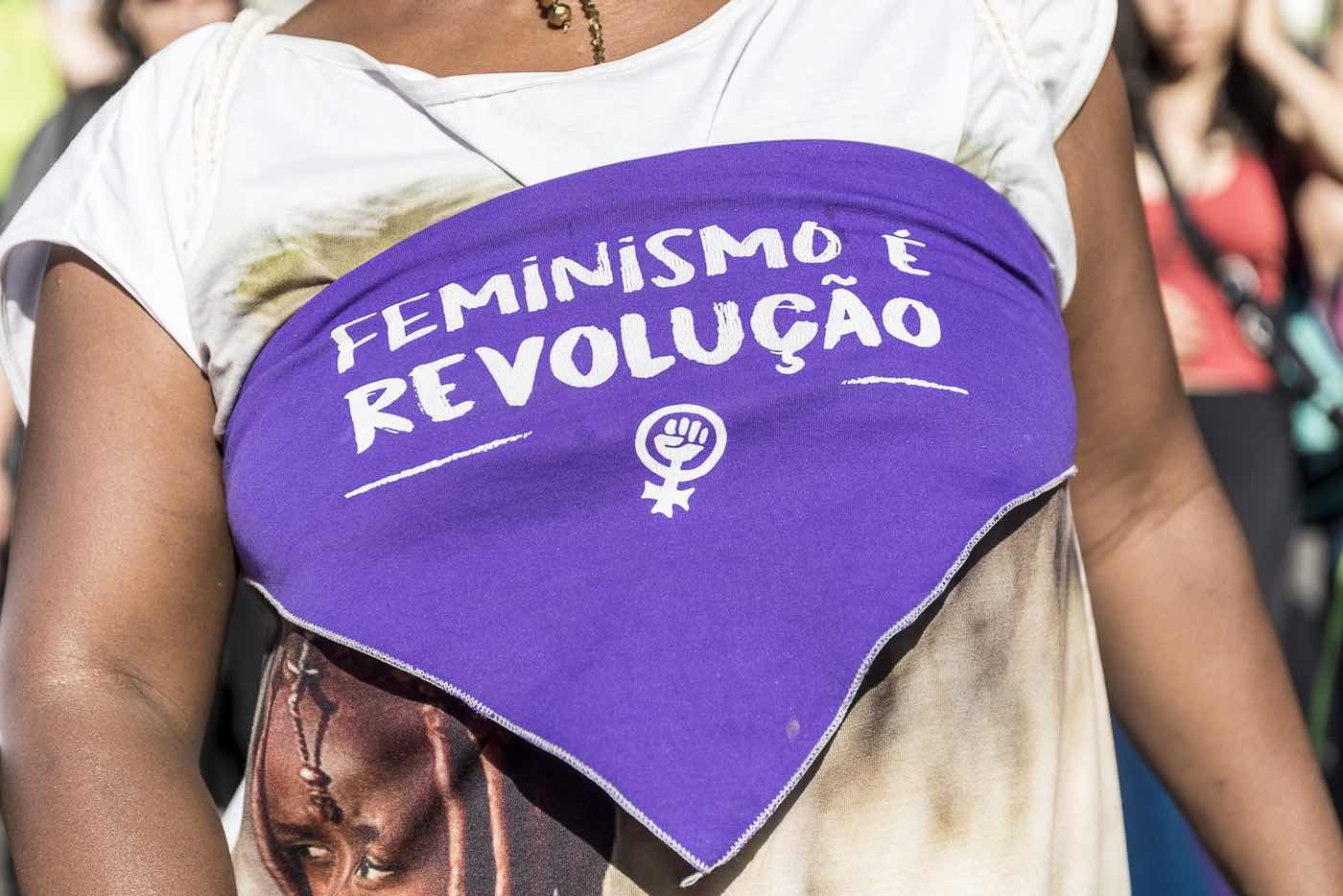
The too-often ignored and silenced sexual division of labor—including of militant labor—needs to be recognized if we are to move beyond the currently-devastating socio-economic system. As repeated by feminist movements, there cannot be a successful fight against capitalism without simultaneous fights against patriarchy, racism, neo-colonialism and anthropocentrism.
Feminisms—for their catalytic, transversal, intersectional, and internationalist narratives and practices—not only provide us with tools to understand and resist the devastating effects of our current system; they allow us to radically rethink our own practices and modes of organization including within the most “progressive” spaces. The week of action against the G20 and the IMF was yet another proof of this.
Demonstration on November 30
On November 30, around 50,000 people marched to Congress Square to repudiate the presence of the G20 and the IMF. We considered this demonstration successful given that the city was on lockdown and many strong unions such as the CGT were absent.
That the demonstration was peaceful was a surprise to many, considering the atmosphere of repression, the depth of the current socioeconomic crisis, and the presence of the IMF—whose responsibility for the devastating 2001 Argentina financial crisis remains rooted in Argentinian collective memory. The situation was expected to escalate like it did during the 2017 G20 summit in Hamburg.
However, the Confluence remained committed to non-violence and never intended to prevent the G20 from happening. From a strategic point of view, while shutting down the G20 would have been symbolically powerful, shutting down such forums is not all it takes to move beyond neoliberalism. For example, shutting down the G20 would not have prevented leaders from meeting again or advancing their agenda in other ways, especially through the use of bilateral free trade agreements and investment treaties—a more common form of organizing in the current world trade system.

“Bluntly put, Argentinian armed forces are in a position where they can repress and kill people with complete impunity.”
Furthermore, demonstrations against neoliberal forums such as the G20 are place-based, contingent, and context-specific. Germany and Argentina are distinctive countries with regards to protest culture, respect for human rights, and police repression. It was not possible to repeat in Buenos Aires what happened at the Hamburg G20; to try would have been suicidal: Argentinian armed forces can repress and kill people with impunity, while Germany would have faced an international scandal had any casualties occurred during the Hamburg G20.
Sharing our experiences from different contexts is necessary because it nurtures future processes of collective strategizing and builds alliances between movements. To this end, some participants in the Hamburg G20 also participated in the week of action in Buenos Aires and compiled their experiences into a book dedicated to the people of Buenos Aires.
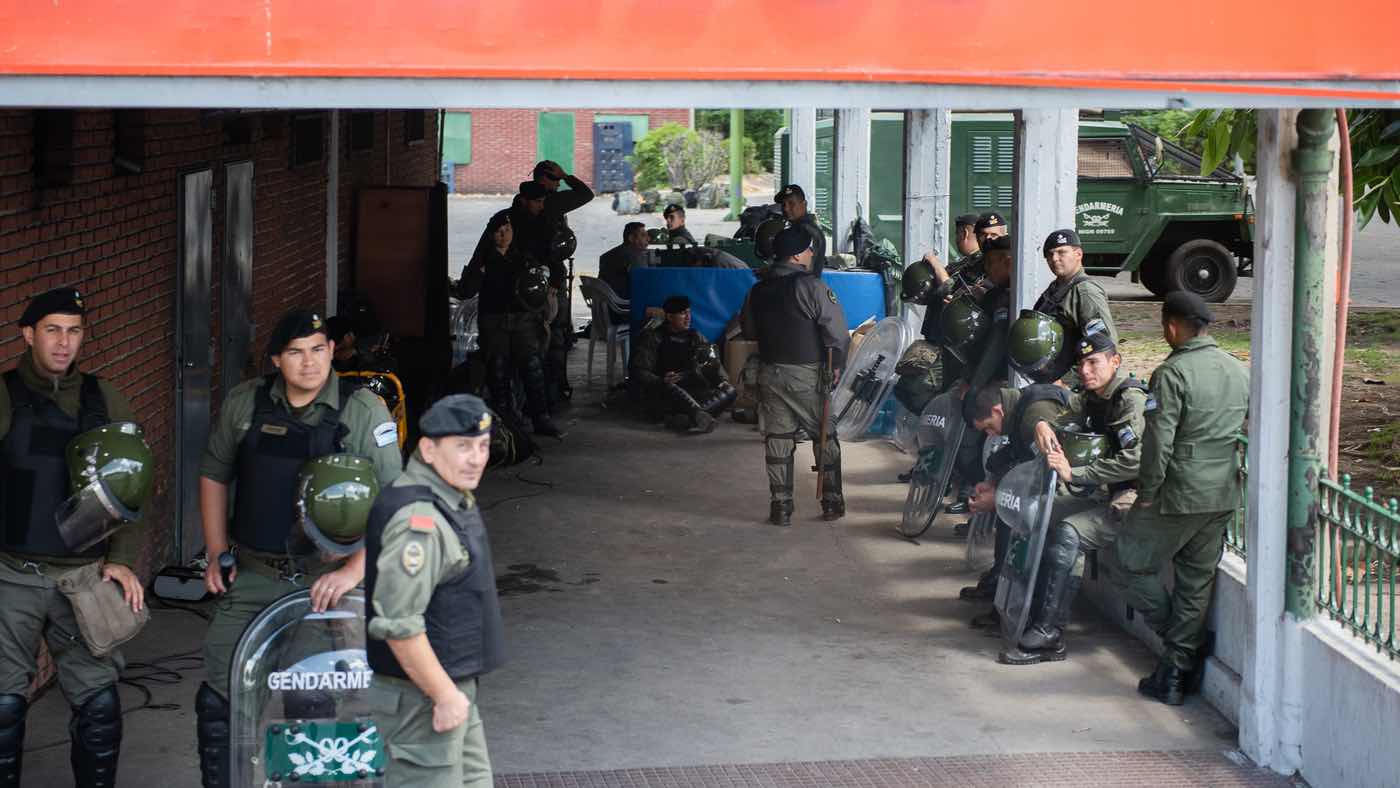
The Importance of Weeks of Action
A week of action is not just a weeklong event. It is an entire year (sometimes two) of work in national and international territories. It raises public awareness about issues we care about, provides information, links grassroots struggles to more systemic processes, and helps us work towards the convergence of communities and movements fighting against the same socioeconomic system of exploitation, violence, destruction, poverty and inequality.
A week of action should not be assessed only in terms of outcomes or number of participants. We should take into account all the work carried out throughout the year; the knowledges produced and disseminated throughout the entire process; the common agenda articulated for the future to come; and most importantly, the alliances, ties, and affections created between peoples and the transformation of personal subjectivities through such processes of collective construction.
“The capitalist elites of our system organize internationally to consolidate their power. Social movements should do the same.”
As we enter a new phase of authoritarian neoliberalism marked by the advance of neo-fascism and new forms of capitalist, patriarchal, misogynistic, racist, and statist violence in all spheres of life, it is essential that we continue strengthening ties between movements fighting these structures of oppression, and that we continue to advance in our construction of better worlds.
Capitalist elites organize internationally to consolidate their power. Social movements should do the same in order to dismantle it, simultaneously strengthening our militant roots in local territories while weaving tapestries of resistance transnationally.
As the G20 leaves Argentina, it does not leave behind only a militarized country; it leaves behind inspiring ideas, incredible memories, and stronger ties between peoples who will continue articulating common transformative agendas locally, regionally, and globally in the collective construction and strengthening of grassroots, systemic alternatives to neoliberalism.
I would like to thank all the inspiring people who, for the past two years, walked with me on the collective roads to building an anti-capitalist, feminist, anti-racist pluriverse.14
-
It is the biggest loan the IMF has ever granted. ↩
-
A Peronist and professor of economics who is also considered to be a possible future presidential candidate. ↩
-
Bolsonaro took over the presidency on January 1, 2019, so he was not a participant anyway. ↩
-
On November 24, 2018, Russian Coast Guard ships fired at, boarded, and confiscated two Ukrainian patrol boats and a towboat; 24 Ukrainian sailors were detained. The Kerch Strait and thus the sea route to the port of Mariupol have been blocked since then and the passage of Ukrainian ships denied. ↩
-
Names have been changed due to fear of reprisal. ↩
-
The interview was conducted in Spanish the week after the summit. ↩
-
At the time of this interview, the exchange rate for 34,000 Argentine Pesos was $950, though it had fallen to $890 within a few weeks. ↩
-
Cristina Fernández de Kirchner, President of Argentina from 2007-2015 ↩
-
In fact, measured absolutely in pesos and as a percentage of the national budget, the social budget under Macri has actually increased. But inflation has compensated for this. In addition, there is another distribution and budget system in which security services in impoverished neighborhoods are declared a “social expenditure,” while support has been sharply reduced, often on the justification of alleged “corruption” in this sector. ↩
-
The presidential era of Peronists Nestor and Cristina Kirchner (2003-2015) ↩
-
Confederación General del Trabajo, the largest trade union in Argentina. It is rather conservative and Peronistically oriented, but is quite strong at mobilizing protests. ↩
-
Based on a screenplay by Florencia Kirchner (daughter of the ex-president), the film *El Camino de Santiago was also shown at CLASCO. ↩
-
December was relatively quiet. Among other things, the government distributed considerable Christmas compensation bonuses and paid outstanding salaries to state employees, in each case from IMF funds. ↩
-
A term from the Zapatista movement: A world that encompasses different worlds, in contrast to the idea of a unified universe. ↩


